#all the whole acting like she was the protagonist of this lifetime movie
Text
when there's a painful little bit on your tongue so you bite it off to make it go away but that only makes it hurt more AND makes it bigger. seems like poor design
#so anyway my mom finally served my dad divorce papers couple days ago after spending the last fifteen years of our lives drinking#and digging herself into the deepest most narcissistically self destructive hole she could manage#all the whole acting like she was the protagonist of this lifetime movie#aaaaand to take the ever loving cake she stole sixty whole ass thousand dollars from my dad's savings account :)#so how's your week going
5 notes
·
View notes
Text
Sachertorte (2022)
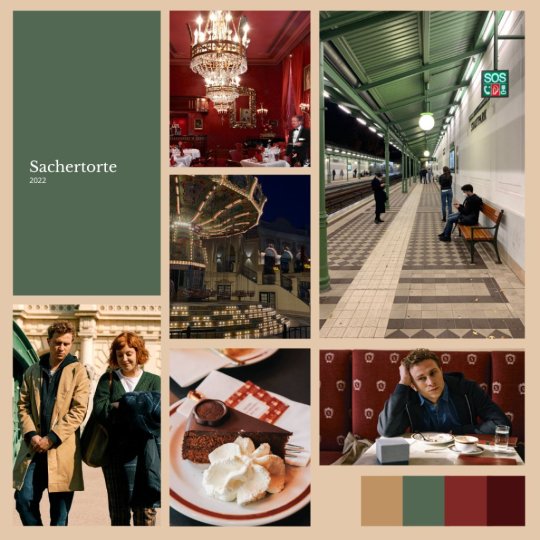
Selenio
"Mr Before Sunrise is looking for Miss Sachertorte."
(⚜︎ 5.5 / 10)

After some long contemplation, I finally caved: I clicked on the little rectangular window that was looming on my "Recommended” list simply because “I’m also from Austria”, I assume…
I have to admit, I was a bit taken aback and prepared for the worst when I realized that “Sachertorte”. a movie about Austria, was written and produced mainly by Germans. (With this sentence alone I have probably by now sent a few hardened Austrians to the ICU with cardiac arrest).
However, when there is one thing that I have learned in my life it is to always judge a book by its cover, and in all honesty, the movie does look quite appealing at first glance.
Or I was simply hungry for Sachertorte.
But I have to admit… I’m a little unsure about this one.
“Sachertorte” (a chocolate cake with apricot jam in between two layers of Austrian origin, named after its inventor Franz Sacher) is a 2022 Amazon Prime original movie, directed by Tine Rogoli.
The premise of the movie can be summed up in just a few short sentences:
Man meets woman under hectic circumstances. Falls in love at first sight with said woman. Accidentally deletes her phone number. Moves to Vienna and frequents the Café Sacher every day at 3 p.m. in hopes of perhaps someday meeting the woman of his dreams (as she told him about her habit of visiting the café each year to celebrate her birthday). But - surprise! - maybe life doesn’t always have to play out like a scripted soap opera… or does it?
⚜︎ Characters (0.7/2)
The fact that I had to look up the protagonist's name before writing this is a testament to him being one of the most obnoxious characters in modern cinema. I seem to have repressed this memory already.
No, but in all honesty, Karl is absolutely delusional and stubborn to the point where he acts like an absolute dunce to everyone around him, including Miriam, who I have come to cherish as my favourite character in the course of the movie.
I also thought Karl’s roommates had a lot of potential in the way their individual characters were set up in the beginning but to my dismay, their only purpose was to serve as hollow plot devices and background noise filler.
⚜︎ Plot (0.9/2)
To be perfectly honest, at times the plot of the movie simply felt like a mere excuse to create an advertisement for the Hotel Sacher or Sachertorte in general. At some points in the movie, I was reminded of these unenthusiastic Viennese tour guides, ushering flocks of tourists through overcrowded castle halls and kitschy attractions. The Ferris wheel for one is something you maybe visit once in your lifetime… maybe even for a second date… but then that’s about enough — Its almost painful slowness is an ironic metaphor for the overall pacing of the film.
I’m usually the last person to judge a piece of media because of its lengthiness but in this case, the whole affair did just feel a little bit artificial and the storyline was neither believable nor truly enjoyable.
The most frustrating thing where the more subtle logical fallacies woven throughout the scenes. It leads to even more over-analyzing and questions such as “What if she skipped this year’s birthday visit?” or “What if she’s held up in traffic and 30 minutes to an hour late?”
It somehow takes away from the overall credibility and doesn’t make me root for Karl’s success but rather makes me beg for him to stop being so utterly delusional.
⚜︎ Writing Style (1.2/2)
I am very undecided about this category.
As a matter of fact, I wasn’t a massive fan of some of the character’s voices. Well, not in a literal sense of course - the actors all had lovely tones and voices.
“Actions speak louder than words” but still, direct and indirect characterization shouldn’t contradict each other. Especially the protagonist, Karl, is presented as way too logical and pragmatic to be sitting in a random coffee shop in another country and waiting on a girl he a) isn’t sure will really eventually show up and b) has only spent approximately two hours with before exchanging numbers.
Sure, the movie is trying to tell the story about finding one’s romantic soul in our hectic day and age but only in superficial ways. Like in telling us Karl’s favourite film (Before Sunrise) and letting other people praise him on his perseverance. It seems as if he’s not only trying to convince them of his impending success but also himself.
Maybe there is some kind of spark about him that I’m simply not getting but to me he is lacking a bit of depth and definitely that certain knack for fantasy and aesthetics, necessary for such irrational actions. His passion seems weirdly constructed and insincere almost as if he’s self-aware In him only playing a role in a movie.
Nevertheless, I do really enjoy the idea of the pursued love interest simply being a vague concept. However, just like the overall premise of this movie - which in my opinion was also quite creative - in the context of the entirety of the work it does feel just a little bit lackadaisical…
My favorite character - as briefly mentioned above - is Miriam, the owner of another small coffee shop. (I just realized that there certainly is a theme of overconsumption of caffeine and baked goods). The casting in this particular case was absolutely brilliant and would probably have benefitted her character even more if they hadn’t restricted her so much with the script. Some of her dialogue and actions - especially at the later end of her character development - feel incredibly forced. There is simply no middle stage between friendship and love, which somewhat destroys her purpose in the movie.
Despite my seemingly harsh criticism, I do think the movie was adequately well written and works as a "one-time-watch-and-enjoy" but could have undoubtedly lived up more to its potential with a more thought-out script. Overall, it undoubtedly has the capability of being what is often called a "comfort movie" for some people and ranks on the higher end of the few romantic comedies I have watched over the years.
⚜︎ Aesthetic (1.7/2)
Austria. Vienna. End of year melancholy. Arts and culture. Need I say more?
Even for the most tedious of movies I have set one single rule: if it is set in Vienna, I will watch it and give it a fair chance. The one singular ounce of patriotism I allow myself beside the annual “Faschingskrapfen” and “Osterlamm”.
There is just something magical about the museums, architecture, and people of Vienna which gives you a certain, dolefully beautiful sense of living in the past and future at the same time. Riding in a horse carriage through busy high-rise avenues or taking HD photographs of architecture from the 18th century. “Sachertorte” gives a remarkably specific, sort of touristy image of our capital, very much viewed from an outsider’s - a German’s - perspective.
Even though Karl may sometimes feel “accepted” by the people he meets he is still in a sense estranged from the city and its customs and philosophy, giving it a sort of hollow feel underneath the pretty shimmering surface. Something, which in my opinion somehow adds to the whole feeling instead of subtracting from it.
⚜︎ Recommendation (1/2)
For this movie, it is really 50/50.
If you have an afternoon to spare, are in possession of a Prime Video subscription, and are prepared for having a major sweet tooth and a longing for good Viennese coffee for a few days; I would say give the movie a watch.
If you are looking for something deeper, world-changing which you will still think about in years to come (but still set in Vienna), I think you’d be better off with something like “The Third Man”. If you like kitschy and don’t mind historical inaccuracy: “Sisi”. If thriller and longer style content is more up your alley, try "Freud".
If you are planning to visit the city, “Sachertorte” will most certainly get you in the mood.
Overall, I did really enjoy watching the movie, even if I may have raised my eyebrow at some of the scenes.
Due to major time struggles, I was forced to view it in two parts and perhaps this took a little bit away from the magic. “Sachertorte” is not a bad movie by any means. It is just somehow… very average and feels like it could have benefitted from just a little more production time (and effort).
„Dass er mir aber keine Schand' macht, heut Abend!"
"But don't let him disgrace me tonight!" - Fürst Metternich, the first time "Sachertorte" was served
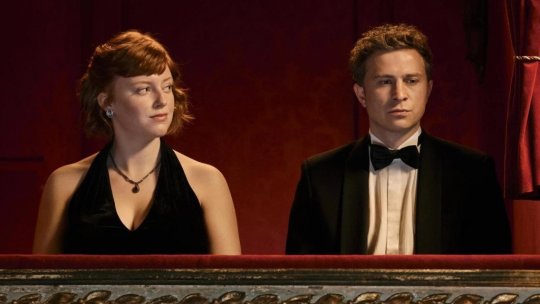
#art#cinema#film#film critique#film review#german#german movie#austrian movie#austria#media#movie#review#romance#romcom#sachertorte#vienna#selenio
1 note
·
View note
Text
Some thoughts on Romani
I created this account to dump thoughts on general. All the Solomon-topic bubbling up some weeks ago with the movie made think about Romani again.
But I think Romani’s a good character, at least he resonated well with me and I think he resonates pretty well with FGO’s story as a whole.
FGO like pretty much every Nasu story is an extremely humanistic narrative that cherishes humanitarian values on its greatness. While stories like Tsukihime or Fate/Stay Night deal with people trying to become human again, or trying not to fall into a dead-end path, FGO in turn is the journey about someone who was never human but wanted to become one.
Saying that I remember read in "Anatomy of a Story" something that sump up well what characters like that mean to a story:
"We might say that theme, or what I call moral argument, is the brain of the story. Character is the heart and circulation system. Revelations are the nervous system. Story structure is the skeleton. Scenes are the skin."
Good characters are the heart of a story, they're meant to be what moves the story and the ones who tell the reader what it's all about. Its themes, arcs, questions and messages are the story itself.
The big thematic point of FGO's first arc is about freedom of choice and identity self-recognition about who you are as a person; Mash was born and raised as someone who was not allowed or taught the act of thinking for herself or having autonomy as someone. Her journey is to find herself and who she is, what she want to protect and acknowledge her own wishes. However it's the same journey that we see Romani take throughout it. King Solomon was said to be an inhuman, god-responding machine who never acted for people as individual. A living weapon who fulfilled only the role he was given.
In the very same book Truby explain something very important for our hero's arc that's
“You hero has two things: what they want and what they need, and what they need was never what they wanted to being with. That's what their journey is all about. Of course, stories are never formulaic, this is just one of the many structures that can be adopted in the construction of a protagonist. But I particularly believe that it is the one adopted here.”
Even after having his wished by the Holy Grail Solomon hadn't progressed in nothing. Faced with a journey from scratch trying to help humanity on his own and after joined the Marisbury's venture he still didn't see how what he saw could be prevented. The most interesting thing about all this is that even though he understood people more, he was still one step behind the very wish he made; Romani was still afraid to trust people as a reflection of his old self. Other than that, he still lacked his sense of freedom, a big reason Romani several times in early events and Interludes said he loves sea adventures is probably because they're the very representation of a boundless freedom. At least, on my perspective.
While Romani was more human than before and was working with one of our "gotta save humanity" guys, there was still a fundamental flaw that wasn't solved in his persona yet. Just like he always did - by again sitting from a chair he saw things from afar; what he observed was the journey of a girl like him, who was raised to be a nobody. A machine tp serve to others and wasn’t meaning to even think on her own. This same girl learned the value of recognising, prioritising and valuing her own desires, of using her power to defend what she believed was right, the value of a someone's freedom, the importance of what protecting others means, the maturity of recognising one's own past and finally how precious the value of life holds during mere seven singularities. In the end such a young life did what King Solomon never did in his lifetime: she acted. Not because she was ordered, or simply because the notion of protecting an organisation, but because it was something she just wanted to do out of her own heart. And faced with this ephemeral life that meant more than any achievement, Romani decided to follow her example and do something he never did: act. King Solomon rose from his chair not to prevent a great extinction or create a great civilisation but simply to protect what he believed he should protect from his heart - from his own will. Mash's journey compelled the most inhuman and exempt of figures to do something he never did and acknowledge his own desires with the freedom he felt he had to act for it.
In the end Romani never got what he strove so much to achieve, but achieved something more meaningful. Once again representing the beauty of a life that accomplishes much just by existing, Romani sacrificed himself for what he believed in, regardless of whether what he saw was forewarned or not. As the journey of the last person who could display humanity ended and along with that to demonstrate the beauty of how small, but meaningful a single man’s life can be.
And in "The Story", Robert McKee illustrate very well what a character is about in that sense:
"We cannot ask which is more important, structure or character, because structure is character; character is structure. They’re the same thing, and therefore one cannot be more important than the other."
Romani is the very living representation of FGO's overall message. The message of humanity from Arc 1. As well as his loss, his speech about how beauty exists in small lives is the representation of Arc 2 whose message is about how everything must come to an end, but that end doesn't always mean something bad, but that its existence was good enough to be praised in what it achieved in such a short period. A thematically weighty character who represents and exposes everything this story is about in every aspect, and cannot exist without the story, just as this story cannot exist without him.
Thanks for your time reading it. I may have misinterpreted numerous conceptions about the character, so my apologies.
15 notes
·
View notes
Text
So, about the movie...
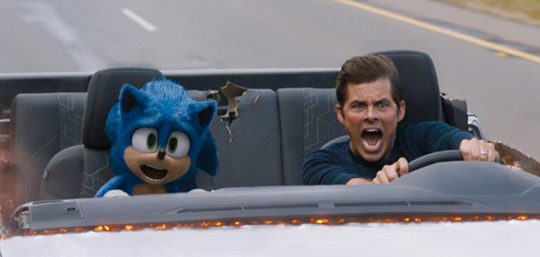
At long last, a week after it came out, I was finally able to see the Sonic movie. The Daytona 500 being held across the street from my favorite theater and conflicting work schedules had been keeping me away, but now I’ve finally seen it. And it was...
Decent!
Which is way, way, way, way, way better than a movie with this awful premise has any right being. That’s for damn sure. I enjoyed my time at the theater. I don’t know how they did it, but they did it. If you like Sonic and haven’t already seen it, you will probably get a kick out of this film. If you don’t like Sonic (or Jim Carrey), there is very little in this movie for you
Okay, now that that’s out of the way, it’s time to break that whole movie down. This will contain full spoilers for the Sonic movie
This movie kinda gave me deja vu because it’s set up so similarly to the Bumblebee movie. Both open with a slavishly faithful CGI sequence on another planet to ensure long time fans that the creative team gives a shit, but a conflict sends the title character to Earth. There, they form an emotional bond with the human lead as they’re pursued by the bad guys, who are working with the US government and tracking the energy signature of the title character. This setup worked extremely well for Bumblebee, because it’s so similar to the usual plot of Transformers. For Sonic, it was... a mixed bag. But it worked better than I expected

(This shot does not happen in the movie.)
That opening though, huh? Green Hill Zone looked great, and I was pleasantly surprised to see they did, in fact, use the Hyper Potions track from Sonic Mania in the actual film. (The piano rendition of the Green Hill theme used later was also lovely.) Longclaw was also interesting. I’ve seen one person bring up all the bird-themed ruins in Sonic 1 and 2 as a possible source of inspiration for the character, and I think that’s a valid take. And man, the echidnas! I wasn’t expecting that AT ALL. I guess that was probably the Knuckles Clan or something? I would never, ever picture them being alive during Sonic’s lifetime, but like... I guess Knuckles had to come from somewhere, right? If they do another movie with Knuckles, will the rest of his kind have died out?
Sadly, though, this sequence felt like it was over in a heartbeat. We barely see Sonic’s life on his home planet, and we’re expected to feel emotional over Longclaw’s sacrifice when she only gets like three lines before Sonic is sent to Earth. This is a common theme with the film--it goes for these big emotional beats that it just does not earn with its rapid fire pacing
Anyway, then we fast forward and Sonic’s a teen. This is actually kind of an interesting one if you’re constantly neck deep in Sonic Character Analysis like me, because it’s a pretty different take on the character. It’s hard to give them credit for doing something somewhat fresh with the character, though, because like... how much of that was intentional, and how much was just Hollywood writers trying to squeeze a generic action-adventure movie out of Sonic? (Honestly, it’s probably mostly the latter.)
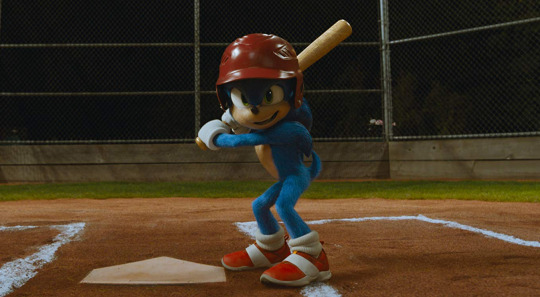
The closest other piece of Sonic media to the movie would probably be Sonic X, a story in which Sonic isn’t really the protagonist. The Sonic of the anime is fairly emotionally distant. He cares deeply about his friends, and does nice things for them, but he’s totally fine with running off on his own for extended lengths of time, and he doesn’t really talk about his feelings. He’s not the character the audience is meant to sympathize with, but is instead this cool older kid who Chris wants to impress. This is pretty much in line with how Sega likes to depict the character. He cares about his friends, but he’s also cool with being a loner. It feels like he only runs into them incidentally, usually when Eggman is causing trouble, and then when the crisis of the week is taken care of he’s back to going on his own adventures. There’s a reason why one of his catchphrases is “long time no see”
The Sonic of the movie is the polar opposite. His main conflict is that he’s lonely and desperately seeks friendship. He’s also an overly-eager, extremely earnest goober. He literally flosses twice. (Which I loved.) I’ve seen him compared to Silver, and honestly, that’s not a bad comparison. I did like it, though! I don’t mind Sonic being a more emotionally open character, like he was in a lot of older Western media. I mean, he cried in like the second or third episode of SatAM
It’s just that, like many things in the movie, it feels less like a deliberate creative choice and more like a logical string of decisions to make when writing a generic action-adventure film for general audiences. Sonic’s the only one of his kind on Earth, so of course he’d be lonely. He has to have some sort of arc for audiences to connect with him, and if he’s gotta be accompanied by James Marsden for the whole movie, well, his arc’s gotta be about them becoming friends
I’ve gotta say, though: Ben Schwartz is great as Sonic. As much as I like Roger Craig Smith, I wouldn’t complain if he became the new main voice of the character. And thanks to the redesign, he looked great. I can’t imagine how nightmarish this movie would’ve been if Sonic wasn’t cute
My main fear with this movie, though, was that Sonic wouldn’t really be the protagonist. As a fan of Transformers, I know all too well that the cost of doing a full CGI character usually means that said character can’t really be the star of the film. Optimus and Bumblebee aren’t the stars of the Transformers movies--they’re supporting characters who are primarily present for the sake of the action scenes. The humans are the real stars in those movies, and the robots are barely even characters. I was terrified that Sonic would be the same, with the actual character I paid to see taking a backseat to James Marsden The Cop
I’m not quite sure if they struck the right balance there, but they did better than I worried they would. Sonic is central enough to the film and gets enough screentime that you can easily say he’s the protagonist. BUT there is absolutely too much of Tom and his family. The human cast is fine, the performances are fine, and there were a few good jokes, but every time the movie tried to get me to care about Tom’s life I was bored out of my mind. It’s just so trite and passionless. The other characters barely felt fleshed out at all, including Tom’s girlfriend (wife?) and Agent Stone. The little girl who gives Sonic the shoes had some cute moments, though
I do, however, love the part in which James Marsden is walking around in a San Francisco t-shirt, to remind us that he’s planning on moving to San Francisco... which then becomes the excuse for Sonic to think about San Francisco and accidentally send his warp rings there, which becomes the excuse for the buddy road trip aspect of the film. And as much as that was a focus of the marketing, the actual road trip part is like... maybe 20 minutes of the movie? There’s like three scenes with Sonic and Tom on the road and then they’re in San Francisco for act 3. The movie tries to act like they’ve formed this deep bond and I just did not give a shit. I don’t care about the cop. All Cops Are Bastards, and that absolutely includes Tom, whose dream in life is to join the extremely corrupt San Francisco PD
The whole excuse for Sonic having to sit in the passenger seat of a car going the speed limit for a good chunk of the movie is also, just. Stupid. If he doesn’t know where San Francisco is and time is of the essence, just... give him a map?
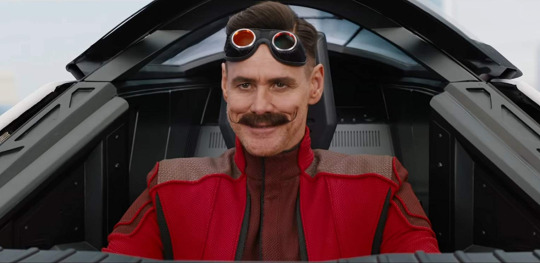
And then there’s Jim Carrey. I was worried about this one. The previews tended to highlight his most Jim Carrey Being Wacky moments, and as fond as I am of movies like The Truman Show and Bruce Almighty, that’s just. That’s not Robotnik. I was pleasantly surprised by the actual movie, though! I thought he was pretty good. I’m not sure what incarnation of Eggman I’d most compare him to, but like... it was close enough, and he was entertaining enough. I’d pay to go see another movie with him as Robotnik. Sure. (Especially with how he was looking at the end of the film.)
There were some other little interesting tidbits here with Eggman, although again, a lot of that is less “let’s do a new take on Eggman” and more “let’s do a marketable movie with Eggman in it, which requires us to explain some stuff.” Like him straight up just being a normal human from Earth, with none of the confusion present in the current “two worlds” canon of the games. Or him apparently being an orphan who was bullied in school, and who trusts machines more than other humans. It’s a safe way to depict the character in a Hollywood movie, but I thought it worked
The way they got to his nickname was kind of funny, though. Like, obviously they didn’t put Jim Carrey in a fat suit, and thank god for that. So instead of mocking his weight, the nickname is derived from the egg-shaped robots he uses. Which made sense, I guess. It at least felt logical for this incarnation of Sonic, who had annoyingly been calling Tom “Donut Lord” the whole movie, to make up the nickname “Eggman.” (Said robots, by the way, were a weak point of the movie to me. They just didn’t have that Eggman whimsy and felt very safe and very Hollywood. Honestly, though, if they had just made Robotnik’s ship grey and slapped some hazard stripes on it, it’d probably be fine.)
As a whole, I thought the humor of the movie was... okay. Sonic had a lot of good moments thanks to Schwartz’s great performance, as did Robotnik. There were just so many weird lines, like James Marsden telling Robotnik that he was breast fed, or the agonizingly long child trafficking joke with Sonic in the duffel bag. Stuff like that
The action was great, though. They definitely owe a lot to the Quicksilver scene in that one X-men movie (I forget the one), but they had a lot of fun with Sonic’s powers and it felt extremely true to the character. Seeing him do one of his Smash poses during the San Francisco fight was great. The action scenes were an absolute delight
And then the ending. Oh, that ending
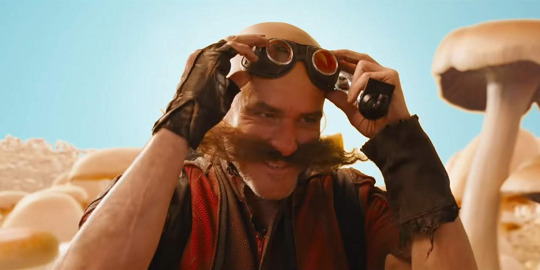
So, I had already heard that Tails shows up in the stinger before I saw the film. And when I heard that, I expected it to be like, the classic Tails origin story. Maybe Sonic would return to his planet, and run into this precocious kid who decides to follow him around... but no! Not at all! Tails is already the Tails we know and love. He’s already an inventor, he’s already tracking down Sonic. I’m shocked that Sonic actually stayed with Tom instead of running off to have new adventures, but hopefully this is a sign that more characters will be brought into the fray if they make a sequel
And boy, they better make that damn sequel. This movie had a great opening weekend and a positive reception. They have no excuse not to. GIVE US SONIC AND TAILS GOING ON AN ADVENTURE
Other stray thoughts
Holy shit they put Sanic in the movie
The Sega logo animation meant that Kiryu from Yakuza was in this movie for a few seconds
The pixel art credits sequence, which featured both the Sonic 2 special stage and Get Blue Spheres as well as the Eggman logo screens from the Studiopolis Zone boss, was cute
The Saturn logo could be seen on the diagram of the other habitable planets
Robotnik had a label for “Badniks” on his circuit breaker. I wonder if the drones in the movie are intended to be Badniks, or if we’ll see actual ones if a sequel gets made
Also, was it implied that Robotnik committed war crimes for the US government
One of the government guys who I think only got one line was played by Garry Chalk and as such sounded exactly like Optimus Primal
I can’t tell if Sonic getting a red race car bed was an intentional shout out to the Archie comics or if it’s just a coincidence, but I loved it
A dude about my age wearing a Sonic Mania t-shirt literally stood up and clutched his head in shock when Tails showed up
After the movie a very excited kid got his mom to take his photo with the Sonic display in the lobby. Afterwards he was so excited that he flossed
I can’t believe they talked about Olive Garden so much
301 notes
·
View notes
Text
45 M/M Gay Movies, Ranked
The other day I bit the bullet and decided to watch Brokeback Mountain for the first time. All I knew about that movie was that it was basically the CMBYN of yesteryear and somebody got killed with a tire iron. Anyways, so I finish the movie and realize that I’ve seen a *lot* of gay movies, especially in the last couple of years. So here are my rankings according to nothing but my personal preference. I won’t write about all of them, but you can ask about something if I leave it out.
I wish I could give you a rubric for this. The reality is, there are some radically different movies on this list with different tones and intentions. There’s buddy comedies, tearjerkers, small indie features, big theater releases. So trying to rank them all is TUFF.
The Way He Looks - Such a beautiful coming-of-age movie. Maybe the 2nd one I saw on this list? Perfect length, perfect characterization, simple yet compelling, clever. And nothing feels better than reaching a happy ending (for once, because some of these movies’ endings-- SHEESH) that’s been earned. It just hasn’t been topped.
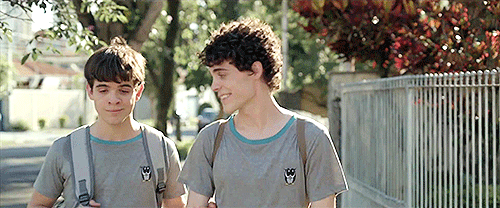
2. God’s Own Country
3. Pride
4. Kanarie - Yea, we don’t talk about this movie enough. It’s one of the most recent that I’ve seen. Beautiful. The way that it references apartheid and the war to reflect the protagonist’s feelings? Flawless.
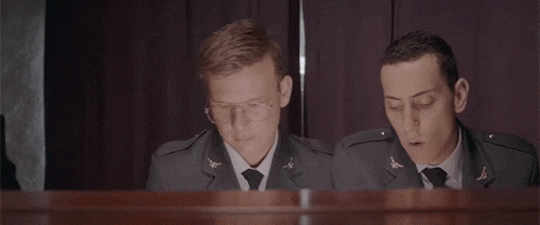
5. Jongens - The first movie that I saw on this list, gets many a bonus point for that.
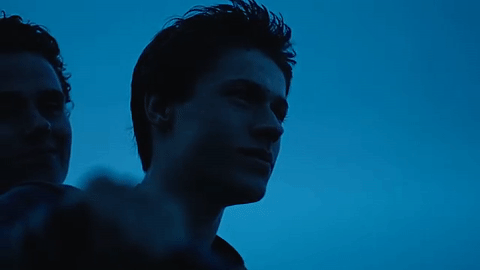
6. Moonlight - Yes, I am black. Yes, I understand this movie may be too low. Moonlight kind of scares me. In general, there’s not nearly enough discourse surrounding this one for me. But while it’s not exactly a popcorn-muncher, to me it’s the most personal movie on the list. When I look at Chiron and all that he’s been through, I can’t help but draw parallels to my own story up to this point. It holds a mirror up to me in a way that no other movie on this list does. That makes me uncomfortable.
But it is so poetic. Have you guys seen the script for this? The directing, the SOUNDTRACK, the acting. Phenomenal.
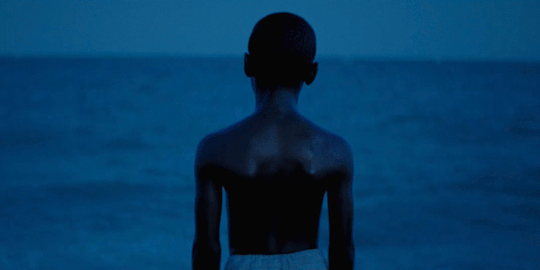
7. Weekend
8. Call Me By Your Name - Yes, I am aware of people’s beef with this one. Yes, I understand a lot of people may feel this one is overrated. While I do think this one gets worse on rewatch, the truth is, it’s not really *that* overrated because hot take: most (meaning over half) of the movies on this list range somewhere from “just okay” to “painstakingly bad”.
It’s the score, the cinematography, the subtext in most all of the dialogue, the acting, the way that you can smell the apricots through the fucking screen. People who say this movie is a vacation ad are fucking CORRECT. One of my biggest gripes however is that it’s too fucking long. And uh, that age difference...
And Armie Hammer’s a weirdo...
9. Dating Amber* - Dating Amber has one of those “Duh” premises that sounds like it could’ve been done like 30 times before yet I can’t think of any other examples of it. So what you’d think would be a wacky premise actually turns out to be a frankly poignant movie with an emotional story arc for the main two characters.
10. Hello Stranger: The Movie* - This movie, which is the first sequel (sorta) on the list, frankly had no business being as good as it was. Even though the web series is required viewing, I felt the movie fixed like all of the series’ issues: pacing, lack of compelling drama, the awkward quarantine format. The drama and stakes are there without us having to visit Angst City. And the theme and the ending reprise is HEAT.
11. Uncle Frank* - Uncle Frank is like The Help of gay movies. Like The Help, it’s *overall* a short, sweet and fluffy movie set decades ago. Like The Help, you’ll still come out of it feeling pretty good even though it has some dark moments. Also like The Help, you’ll wonder after the fact if the central white girl absolutely needed to be so...well, central for this story to be told. Bonus points for Paul Bettany and Character Actress Margo Martindale.
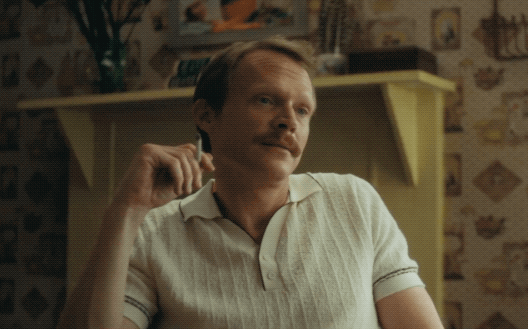
12. Brokeback Mountain - Tragic.
13. Moffie - Set during the South African border war, same as Kanarie. You even hear the word “moffie” throughout Kanarie. Anyways, this is a war movie for the gays, and a very intense watch. I liked that it was a much more realistic view of what a soldier endured during that period, and of course on the flip side I thought it was more thorough in its depiction of the rampant racism. I gotta find a good book on this era.
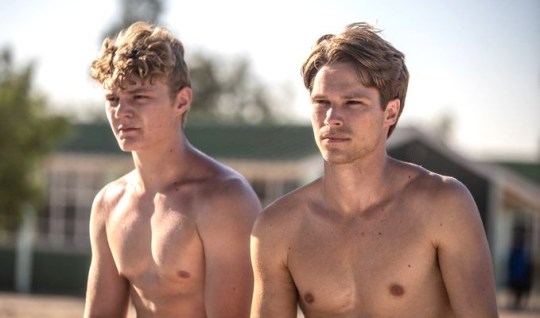
14. A Moment In the Reeds
15. Get Real - Maybe the most out of place movie on the list. I need to rewatch it. I do recall absolutely loving the score, however. Like, I fucks with this:
youtube
16. Freier Fall - When I finished Brokeback I was like, “Wait, wasn’t that just Free Fall with extra steps?” And yea, it kinda is. But even discount Brokeback is still pretty good.
17. Beautiful Thing - There are few things to like about this one, the relationship between the two guys, the mother’s love for her son even though it’s not all rainbows, that nice little final scene. I did not care for the dark-skinned woman being portrayed as, you know, the drug abusing, school dropout, gossipy, butt of jokes neighbor. But that guy really looks like Tom Holland tho.
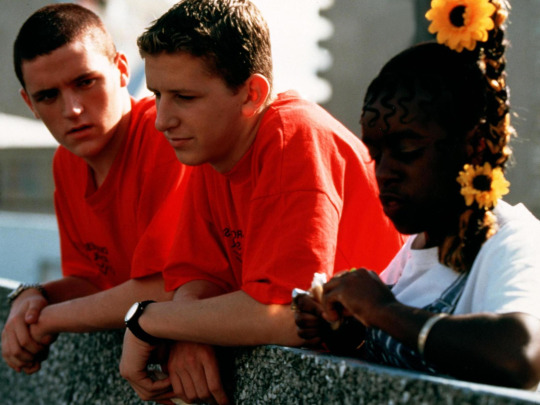
18. Love, Simon - It’s at this point that I move from “Yea, that movie is good, you should watch it!” to “Look, you may like it, you may not.”
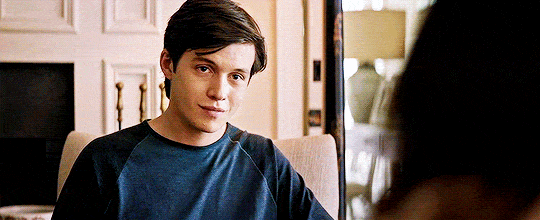
19. The 10 Year Plan - This movie is so fucking cheesy that there was cheddar coming though my speakers. But when I think of “Hallmark/Lifetime, but for the gays” this is the crown jewel. There’s some other movies on this list that could’ve taken some notes.
20. The Christmas Setup* - The trend of fluffy-white-gay-cable-network-movie continues and in good form. It’s not deep. It’s not really thought provoking. It’s cute. Fran Drescher is there. You should watch it.
21. Giant Little Ones
22. Hidden Kisses
23. Alex Strangelove - In a unique twist, the emotional core of this one is arguably between Alex and his girlfriend. All that ends up happening, however, is we the viewer keep wanting more Alex/Elliott scenes; those are the most electric in the whole movie. The end result is a hot yet endearing mess.
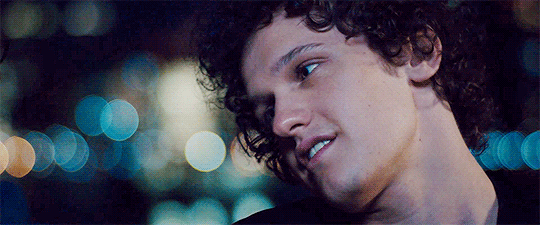
24. Fair Haven
25. The Thing About Harry - Freeform’s attempt at making a cheesy rom-com for the gays. It’s...okay. I personally feel like the main character’s friend is highkey trifling but it’s whatever.
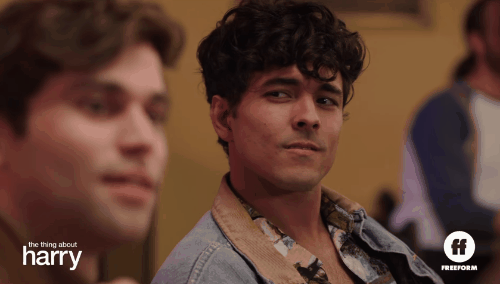
26. Your Name Engraved Herein* - So I guess I’ve decided I officially hate angst. I mean, I get how it’s often necessary to tell an effective story, but I’m just not here for 2 hour indie angst fests that get passed off as “high art” anymore. I cannot do it. Somehow this is Brokeback’s fault...there just has to be a better way to tell gay stories in the 2020′s. Anyways, the last song was fuego.
27. The Perfect Wedding - Easily the most bizarre movie on this list. It’s so bad, I liked it a lot.
28. Naz and Maalik - The first half of the movie with the two leads just riffing is some pretty great stuff. The back half starts throwing plot developments that are just less than interesting.

29. My Best Friend
30. The Curiosity of Chance
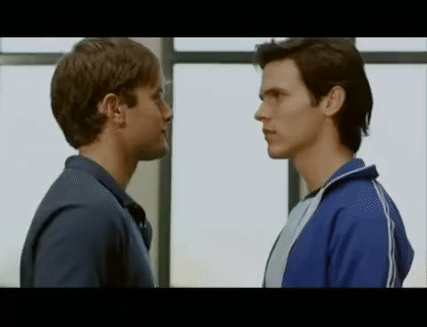
31. Being 17 - Boring. Angsty.
32. And Then We Danced
33. Center of My World - Has some of the most trifling characters EVER. I was so angry. This movie for me has *0* rewatchability.
34. Just Friends
35. 4th Man Out - This movie was basically “a bro/Hangover-style movie, but for the gays.” I absolutely love the intention, but the execution was a little shoddy. One day we’re gonna get a flawless movie that nails what this movie was going for. I hope we remember this movie whenever that day comes.
36. Latter Days - So fucking preachy.
37. GBF - Another bizarre one, but at least this movie gets how wacky it is.
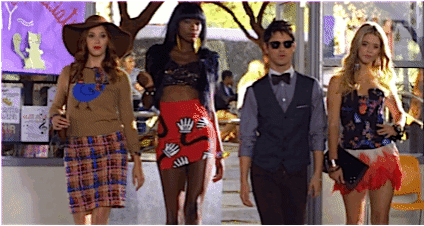
38. Beach Rats
39. Shelter - I’ve noticed a lot of people like this one. To that I say...yikes. Remember that scene from Family Guy where Peter says he doesn’t care for The Godfather? I did not care for Shelter. It insists upon itself (not really, but still).
40. Handsome Devil
41. Esteros - It’s at this point of the list that we shift from “Movies that are the definition of ‘ight’ “ to “These movies are bad. Bad. BAAAAAD.”
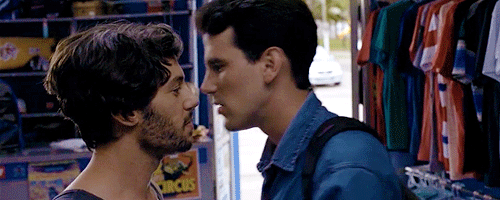
42. Monster Pies
43. Were the World Mine - I couldn’t even finish it. Wanna watch a better musical? Go watch Kanarie. Wanna watch a better Shakespeare adaptation? The Lion King is the movie for you, or even fucking She’s the Man.
44. North Sea Texas - So boring. I actually think this one may need a rewatch, because I swear it shouldn’t have been as terrible as it was.
45. Salvation Army - I have no idea what this movie was going for. I understand that it is autobiographical, however...it simultaneously barely has any plot or character developments. This one has shades of Beach Rats, but it’s significantly worse, and I didn’t even like Beach Rats that much.
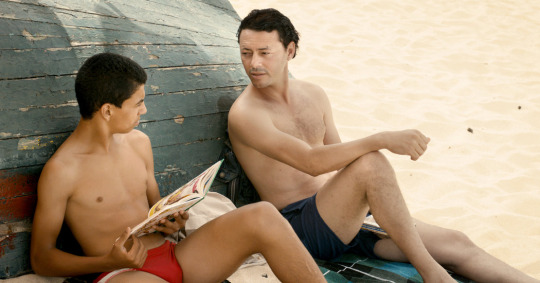
So that’s it, thanks if you made it down this far. I guess I’ll update the list as I inevitably watch more of these. I would love movie recommendations!
#lgbtcinema#the way he looks#cmbyn#love simon#thanks for reading#thanks profusely to the gif-makers#i couldn't finish maurice...i'm so sorry#half of these are breaking glass or wolfe#argue with yo mama
48 notes
·
View notes
Text
The Best Films of 2020
I can’t tell you anything novel or insightful about this year that has been stolen from our lives. I watched zero of these films in a theater, and I watched most of them half-asleep in moments that I stole from my children. Don’t worry, there are some jokes below.
GARBAGE
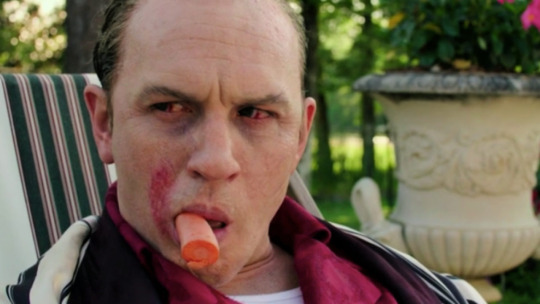
93. Capone (Josh Trank)- What is the point of this dinner theater trash? It takes place in the last year of Capone's life, when he was released from prison due to failing health and suffered a stroke in his Florida home. So it covers...none of the things that make Al Capone interesting? It's not historically accurate, which I have no problem with, but if you steer away from accuracy, then do something daring and exciting. Don't give me endless scenes of "Phonse"--as if the movie is running from the very person it's about--drawing bags of money that promise intrigue, then deliver nothing in return.
That being said, best "titular character shits himself" scene since The Judge.
92. Ammonite (Francis Lee)- I would say that this is the Antz to Portrait of a Lady on Fire's A Bug's Life, but it's actually more like the Cars 3 to Portrait of a Lady on Fire's Toy Story 1.
91. Ava (Tate Taylor)- Despite the mystery and inscrutability that usually surround assassins, what if we made a hitman movie but cared a lot about her personal life? Except neither the assassin stuff nor the family stuff is interesting?
90. Wonder Woman 1984 (Patty Jenkins)- What a miscalculation of what audiences loved about the first and wanted from the sequel. WW84 is silly and weightless in all of the ways that the first was elegant and confident. If the return of Pine is just a sort of phantom representation of Diana's desires, then why can he fly a real plane? If he is taking over another man's soul, then, uh, what ends up happening to that guy? For that matter, why is it not 1984 enough for Ronald Reagan to be president, but it is 1984 enough for the president to have so many Ronald Reagan signifiers that it's confusing? Why not just make a decision?
On paper, the me-first values of the '80s lend themselves to the monkey's paw wish logic of this plot. You could actually do something with the Star Wars program or the oil crisis. But not if the setting is played for only laughs and the screenplay explains only what it feels like.
89. Babyteeth (Shannon Murphy)- In this type of movie, there has to be a period of the Ben Mendelsohn character looking around befuddled about the new arrangement and going, "What's this now--he's going to be...living with us? The guy who tried to steal our medication? This is crazy!" But that's usually ten minutes, and in this movie it's an hour. I was so worn out by the end.
88. You Should Have Left (David Koepp)- David Koepp wrote Jurassic Park, so he's never going to hell, but how dare he start caring about his own mystery at the hour mark. There's a forty-five minute version of this movie that could get an extra star from me, and there's a three-hour version of Amanda Seyfried walking around in athleisure that would get four stars from me. What we actually get? No thanks.
87. Black Is King (Beyonce, et al.)- End your association with The Lion King, Bey. It has resulted in zero bops.
ADMIRABLE FAILURES
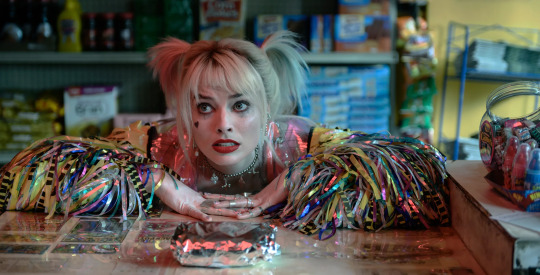
86. Birds of Prey (And the Fantabulous Emancipation of One Harley Quinn) (Cathy Yan)- There's nothing too dysfunctional in the storytelling or performances, but Birds of Prey also doesn't do a single thing well. I would prefer something alive and wild, even if it were flawed, to whatever tame belt-level formula this is.
85. The Turning (Floria Sigismondi)- This update of The Turn of the Screw pumps the age of Miles up to high school, which creates some horny creepiness that I liked. But the age of the character also prevents the ending of the novel from happening in favor of a truly terrible shrug. I began to think that all of the patience that the film showed earlier was just hesitance for its own awful ending.
I watched The Turning as a Mackenzie Davis Movie Star heat check, and while I'm not sure she has the magnetism I was looking for, she does have a great teacher voice, chastening but maternal.
84. Bloodshot (David Wilson)- A whole lot of Vin Diesel saying he's going to get revenge and kill a bunch of dudes; not a whole lot of Vin Diesel actually getting revenge and killing a bunch of dudes.
83. Downhill (Nat Faxon and Jim Rash)- I was an English major in college, which means I ended up locking myself into literary theories that, halfway through the writing of an essay, I realized were flawed. But rather than throw out the work that I had already proposed, I would just keep going and see if I could will the idea to success.
So let's say you have a theory that you can take Force Majeure by Ruben Ostlund, one of the best films of its year, and remake it so that its statement about familial anxiety could apply to Americans of the same age and class too...if it hadn't already. And maybe in the first paragraph you mess up by casting Will Ferrell and Julia Louis-Dreyfus, people we are conditioned to laugh at, when maybe this isn't that kind of comedy at all. Well, don't throw it away. You can quote more--fill up the pages that way--take an exact shot or scene from the original. Does that help? Maybe you can make the writing more vigorous and distinctive by adding a character. Is that going to make this baby stand out? Maybe you could make it more personal by adding a conclusion that is slightly more clever than the rest of the paper?
Or perhaps this is one you're just not going to get an A on.
82. Hillbilly Elegy (Ron Howard)- I watched this melodrama at my mother's encouragement, and, though I have been trying to pin down her taste for decades, I think her idea of a successful film just boils down to "a lot of stuff happens." So in that way, Ron Howard's loss is my gain, I guess.
There is no such thing as a "neutral Terminator."
81. Relic (Natalie Erika James)- The star of the film is Vanessa Cerne's set decoration, but the inert music and slow pace cancel out a house that seems neglected slowly over decades.
80. Buffaloed (Tanya Wexler)- Despite a breathless pace, Buffaloed can't quite congeal. In trying to split the difference between local color hijinks and Moneyballed treatise on debt collection, it doesn't commit enough to either one.
Especially since Zoey Deutch produced this one in addition to starring, I'm getting kind of worried about boo's taste. Lot of Two If by Seas; not enough While You Were Sleepings.
79. Like a Boss (Miguel Arteta)- I chuckled a few times at a game supporting cast that is doing heavy lifting. But Like a Boss is contrived from the premise itself--Yeah, what if people in their thirties fell out of friendship? Do y'all need a creative consultant?--to the escalation of most scenes--Why did they have to hide on the roof? Why do they have to jump into the pool?
The movie is lean, but that brevity hurts just as much as it helps. The screenplay knows which scenes are crucial to the development of the friendship, but all of those feel perfunctory, in a different gear from the setpieces.
To pile on a bit: Studio comedies are so bare bones now that they look like Lifetime movies. Arteta brought Chuck & Buck to Sundance twenty years ago, and, shot on Mini-DV for $250,000, it was seen as a DIY call-to-bootstraps. I guarantee that has more setups and locations and shooting days than this.
78. Eurovision Song Contest: The Story of Fire Saga (David Dobkin)- Add Dan Stevens to the list of supporting players who have bodied Will Ferrell in his own movie--one that he cared enough to write himself.
Like Downhill, Ferrell's other 2020 release, this isn't exactly bad. It's just workmanlike and, aside from the joke about Demi Lovato's "uninformed" ghost, frustratingly conventional.
77. The Traitor (Marco Bellochio)- Played with weary commitment by Pierfrancesco Favino, Tomasso Buscetta is "credited" as the first informant of La Cosa Nostra. And that sounds like an interesting subject for a "based on a true story" crime epic, right? Especially when you find out that Buscetta became a rat out of principle: He believed that the mafia to which he had pledged his life had lost its code to the point that it was a different organization altogether.
At no point does Buscetta waver or even seem to struggle with his decision though, so what we get is less conflicted than that description might suggest. None of these Italian mob movies glorify the lifestyle, so I wasn't expecting that. But if the crime doesn't seem enticing, and snitching on the crime seems like forlorn duty, and everything is pitched with such underhanded matter-of-factness that you can't even be sure when Buscetta has flipped, then what are we left with? It was interesting seeing how Italian courts work, I guess?
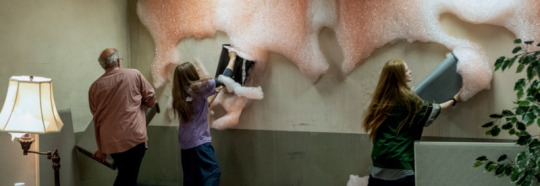
76. Kajillionaire (Miranda July)- This is another movie so intent on building atmosphere and lore that it takes too long to declare what it is. When the protagonist hits a breaking point and has to act, she has only a third of a film to grow. So whispery too.
Gina Rodriguez is the one to inject life into it. As soon as her motormouth winds up, the film slips into a different gear. The atmosphere and lore that I mentioned reeks of artifice, but her character is believably specific. Beneath a basic exterior is someone who is authentically caring but still morally compromised, beholden to the world that the other characters are suspicious of.
75. Scoob! (Tony Cervone)- The first half is sometimes clever, but it hammers home the importance of friendship while separating the friends.
The second half has some positive messaging, but your kids' movie might have a problem with scale if it involves Alexander the Great unlocking the gates of the Underworld.
My daughter loved it.
74. The Lovebirds (Michael Showalter)- If I start talking too much about this perfectly fine movie, I end up in that unfair stance of reviewing the movie I wanted, not what is actually there.* As a fan of hang-out comedies, I kind of resent that any comedy being made now has to be rolled into something more "exciting," whether it's a wrongfully accused or mistaken identity thriller or some other genre. Such is the post-Game Night world. There's a purposefully anti-climactic note that I wish The Lovebirds had ended on, but of course we have another stretch of hiding behind boats and shooting guns. Nanjiani and Rae are really charming leads though.
*- As a New Orleanian, I was totally distracted by the fake aspects of the setting too. "Oh, they walked to Jefferson from downtown? Really?" You probably won't be bothered by the locations.
73. Sonic the Hedgehog (Jeff Fowler)- In some ways the storytelling is ambitious. (I'm speaking for only myself, but I'm fine with "He's a hedgehog, and he's really fast" instead of the owl mother, teleportation backstory. Not everything has to be Tolkien.) But that ambition doesn't match the lack of ambition in the comedy, which depends upon really hackneyed setups and structures. Guiding Jim Carrey to full alrighty-then mode was the best choice anyone made.
72. Malcolm & Marie (Sam Levinson)- The stars move through these long scenes with agility and charisma, but the degree of difficulty is just too high for this movie to reach what it's going for.
Levinson is trying to capture an epic fight between a couple, and he can harness the theatrical intensity of such a thing, but he sacrifices almost all of the nuance. In real life, these knock-down-drag-outs can be circular and indirect and sad in a way that this couple's manipulation rarely is. If that emotional truth is all this movie is trying to achieve, I feel okay about being harsh in my judgment of how well it does that.
71. Beanpole (Kantemir Balagov)- Elusive in how it refuses to declare itself, forthright in how punishing it is. The whole thing might be worth it for a late dinner scene, but I'm getting a bit old to put myself through this kind of misery.
70. The Burnt Orange Heresy (Giuseppe Capotondi)- Silly in good ways until it's silly in bad ways. Elizabeth Debicki remains 6'3".
69. Everybody’s Everything (Sebastian Jones and Ramez Silyan)- As a person who listened to Lil Peep's music, I can confidently say that this documentary is overstating his greatness. His death was a significant loss, as the interview subjects will all acknowledge, but the documentary is more useful as a portrait of a certain unfocused, rapacious segment of a generation that is high and online at all times.
68. The Witches (Robert Zemeckis)- Robert Zemeckis, Kenya Barris, and Guillermo Del Toro are the credited screenwriters, and in a fascinating way, you can see the imprint of each figure on the final product. Adapting a very European story to the old wives' tales of the American South is an interesting choice. Like the Nicolas Roeg try at this material, Zemeckis is not afraid to veer into the terrifying, and Octavia Spencer's pseudo witch doctor character only sells the supernatural. From a storytelling standpoint though, it seems as if the obstacles are overcome too easily, as if there's a whole leg of the film that has been excised. The framing device and the careful myth-making of the flashback make promises that the hotel half of the film, including the abrupt ending, can't live up to.
If nothing else, Anne Hathaway is a real contender for Most On-One Performance of the year.
67. Irresistible (Jon Stewart)- Despite a sort of imaginative ending, Jon Stewart's screenplay feels more like the declarative screenplay that would get you hired for a good movie, not a good screenplay itself. It's provocative enough, but it's clumsy in some basic ways and never evades the easy joke.
For example, the Topher Grace character is introduced as a sort of assistant, then is re-introduced an hour later as a polling expert, then is shown coaching the candidate on presentation a few scenes later. At some point, Stewart combined characters into one role, but nothing got smoothed out.
ENDEARING CURIOSITIES WITH BIG FLAWS
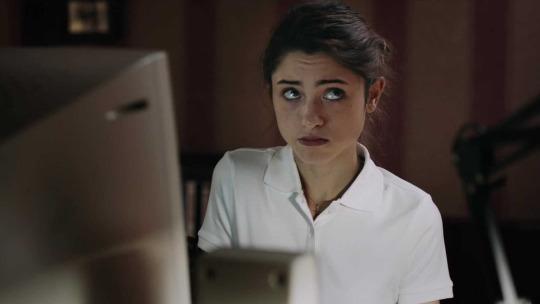
66. Yes, God, Yes (Karen Maine)- Most people who are Catholic, including me, are conflicted about it. Most people who make movies about being Catholic hate it and have an axe to grind. This film is capable of such knowing wit and nuance when it comes to the lived-in details of attending a high school retreat, but it's more concerned with taking aim at hypocrisy in the broad way that we've seen a million times. By the end, the film is surprisingly all-or-nothing when Christian teenagers actually contain multitudes.
Part of the problem is that Karen Maine's screenplay doesn't know how naive to make the Alice character. Sometimes she's reasonably naive for a high school senior in 2001; sometimes she's comically naive so that the plot can work; and sometimes she's stupid, which isn't the same as naive.
65. Bad Boys for Life (Adil El Arbi and Bilall Fallah)- This might be the first buddy cop movie in which the vets make peace with the tech-comm youngs who use new techniques. If that's the only novelty on display here--and it is--then maybe that's enough. I laughed maybe once. Not that the mistaken identity subplot of Bad Boys 1 is genius or anything, but this entry felt like it needed just one more layer to keep it from feeling as basic as it does. Speaking of layers though, it's almost impossible to watch any Will Smith movie now without viewing it through the meta-narrative of "What is Will Smith actually saying about his own status at this point in his career?" He's serving it up to us.
I derived an inordinate amount of pleasure from seeing the old school Simpson/Bruckheimer logo.
64. The Gentlemen (Guy Ritchie)- Look, I'm not going to be too negative on a movie whose crime slang is so byzantine that it has to be explained with subtitles. That's just me. I'm a simple man. But I can tell you that I tuned out pretty hard after seven or eight double-crosses.
The bloom is off the rose a bit for Ritchie, but he can still nail a music cue. I've been waiting for someone to hit "That's Entertainment" the way he does on the end credits.
63. Bad Hair (Justin Simien)- In Bad Hair, an African-American woman is told by her boss at a music video channel in 1989 that straightening her hair is the way to get ahead; however, her weave ends up having a murderous mind of its own. Compared to that charged, witty logline, the execution of the plot itself feels like a laborious, foregone conclusion. I'm glad that Simien, a genuinely talented writer, is making movies again though. Drop the skin-care routine, Van Der Beek!
62. Greyhound (Aaron Schneider)- "If this is the type of role that Tom Hanks writes for himself, then he understands his status as America's dad--'wise as the serpent, harmless as the dove'--even better than I thought."
"America's Dad! Aye aye, sir!"
"At least half of the dialogue is there for texture and authenticity, not there to be understood by the audience."
"Fifty percent, Captain!"
"The environment looks as fake as possible, but I eventually came around to the idea that the movie is completely devoid of subtext."
"No subtext to be found, sir!"
61. Mank (David Fincher)- About ten years ago, the Creative Screenwriting podcast spent an hour or so with James Vanderbilt, the writer of Zodiac and nothing else that comes close, as he relayed the creative paces that David Fincher pushed him through. Hundreds of drafts and years of collaborative work eventuated in the blueprint for Fincher's most exacting, personal film, which he didn't get a writing credit on only because he didn't seek one.
Something tells me that Fincher didn't ask for rewrites from his dead father. No matter what visuals and performances the director can coax from the script--and, to be clear, these are the worst visuals and performances of his career--they are limited by the muddy lightweight pages. There are plenty of pleasures, like the slippery election night montage or the shakily platonic relationship between Mank and Marion. But Fincher hadn't made a film in six years, and he came back serving someone else's master.
60. Tesla (Michael Almereyda)-
"You live inside your head."
"Doesn't everybody?"
As usual, Almereyda's deconstructions are invigorating. (No other moment can match the first time Eve Hewson's Anne fact-checks something with her anachronistic laptop.) But they don't add up to anything satisfying because Tesla himself is such an opaque figure. Driven by the whims of his curiosity without a clear finish line, the character gives Hawke something enigmatic to play as he reaches deep into a baritone. But he's too inward to lend himself to drama. Tesla feels of a piece with Almereyda's The Experimenter, and that's the one I would recommend.
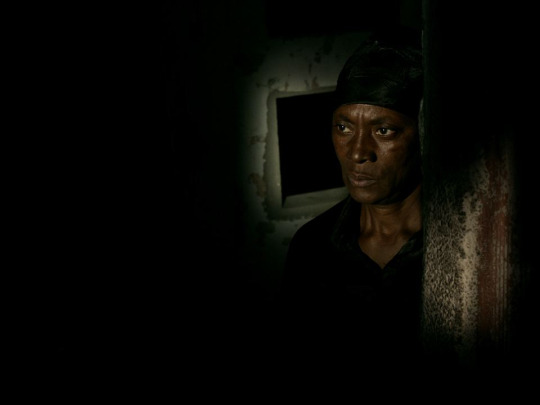
59. Vitalina Varela (Pedro Costa)- I can't oversell how delicately beautiful this film is visually. There's a scene in which Vitalina lugs a lantern into a church, but we get several seconds of total darkness before that one light source carves through it and takes over part of the frame. Each composition is as intricate as it is overpowering, achieving a balance between stark and mannered.
That being said, most of the film is people entering or exiting doors. I felt very little of the haunting loss that I think I was supposed to.
58. The Rhythm Section (Reed Morano)- Call it the Timothy Hutton in The General's Daughter Corollary: If a name-actor isn't in the movie much but gets third billing, then, despite whom he sends the protagonist to kill, he is the Actual Bad Guy.
Even if the movie serves up a lot of cliche, the action and sound design are visceral. I would like to see more from Morano.
57. Red, White and Blue (Steve McQueen)- Well-made and heartfelt even if it goes step-for-step where you think it will.
Here's what I want to know though: In the academy training sequence, the police cadets have to subdue a "berserker"; that is, a wildman who swings at their riot gear with a sledgehammer. Then they get him under control, and he shakes their hands, like, "Good angle you took on me there, mate." Who is that guy and where is his movie? Is this full-time work? Is he a police officer or an independent contractor? What would happen if this exercise didn't go exactly as planned?
56. Wolfwalkers (Tomm Moore and Ross Stewart)- The visuals have an unfinished quality that reminded me of The Tale of Princess Kaguya--the center of a flame is undrawn white, and fog is just negative space. There's an underlying symmetry to the film, and its color palette changes with mood.
Narratively, it's pro forma and drawn-out. Was Riley in Inside Out the last animated protagonist to get two parents? My daughter stuck with it, but she needed a lot of context for the religious atmosphere of 17th century Ireland.
55. What She Said: The Art of Pauline Kael (Rob Garver)- The film does little more than one might expect; it's limited in the way that any visual medium is when trying to sum up a woman of letters. But as far as education for Kael's partnership with Warren Beatty or the idea of The New Yorker paying her for only six months out of the year, it was useful for me.
Although Garver isn't afraid to point to the work that made Kael divisive, it would have been nice to have one or two interview subjects who questioned her greatness, rather than the crew of Paulettes who, even when they do say something like, "Sometimes I radically disagreed with her," do it without being able to point to any specifics.
54. Beastie Boys Story (Spike Jonze)- As far as this Spike Jonze completist is concerned, this is more of a Powerpoint presentation than a movie, Beastie Boys Story still warmed my heart, making me want to fire up Paul's Boutique again and take more pictures of my buddies.
53. Tenet (Christopher Nolan)- Cool and cold, tantalizing and frustrating, loud and indistinct, Tenet comes close to Nolan self-parody, right down to the brutalist architecture and multiple characters styled like him. The setpieces grabbed me, I'll admit.
Nolan's previous film, which is maybe his best, was "about" a lot and just happened to play with time; Tenet is only about playing with time.
PRETTY GOOD MOVIES
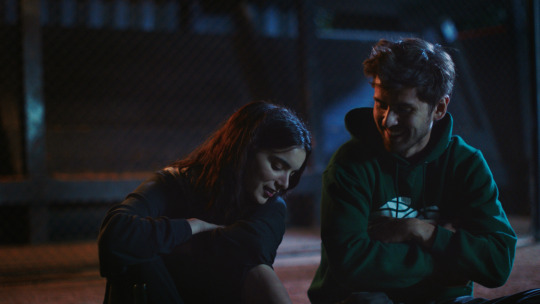
52. Shithouse (Cooper Raiff)- "Death is ass."
There's such a thing as too naturalistic. If I wanted to hear how college freshmen really talked, I would hang out with college freshmen. But you have to take the good verisimilitude with the bad, and good verisimilitude is the mother's Pod Save America t-shirt.
There are some poignant moments (and a gonzo performance from Logan Miller) in this auspicious debut from Cooper Raiff, the writer/director/editor/star. But the second party sequence kills some of the momentum, and at a crucial point, the characters spell out some motivation that should have stayed implied.
51. Totally Under Control (Alex Gibney, Ophelia Harutyunyan, Suzanne Hillinger)- As dense and informative as any other Gibney documentary with the added flex of making it during the pandemic it is investigating.
But yeah, why am I watching this right now? I don't need more reasons to be angry with Trump, whom this film calmly eviscerates. The directors analyze Trump's narcissism first through his contradictions of medical expertise in order to protect the economy that could win him re-election. Then it takes aim at his hiring based on loyalty instead of experience. But you already knew that, which is the problem with the film, at least for now.
50. Happiest Season (Clea Duvall)- I was in the perfect mood to watch something this frothy and bouncy. Every secondary character receives a moment in the sun, and Daniel Levy gets a speech that kind of saves the film at a tipping point.
I must say though: I wanted to punch Harper in her stupid face. She is a terrible romantic partner, abandoning or betraying Abby throughout the film and dissembling her entire identity to everyone else in a way that seems absurd for a grown woman in 2020. Run away, Kristen. Perhaps with Aubrey Plaza, whom you have more chemistry with. But there I go shipping and aligning myself with characters, which only proves that this is an effective romantic comedy.
49. The Way Back (Gavin O’Connor)- Patient but misshapen, The Way Back does just enough to overcome the cliches that are sort of unavoidable considering the genre. (I can't get enough of the parent character who, for no good reason, doesn't take his son's success seriously. "Scholarship? What he's gotta do is put his nose in them books! That's why I don't go to his games. [continues moving boxes while not looking at the other character] Now if you'll excuse me while I wait four scenes before showing up at a game to prove that I'm proud of him after all...")
What the movie gets really right or really wrong in the details about coaching and addiction is a total crap-shoot. But maybe I've said too much already.
48. The Whistlers (Corneliu Porumboiu)- Porumboiu is a real artist who seems to be interpreting how much surveillance we're willing to acknowledge and accept, but I won't pretend to have understood much of the plot, the chapters or which are told out of order. Sometimes the structure works--the beguiling, contextless "high-class hooker" sequence--but I often wondered if the film was impenetrable in the way that Porumboiu wanted it to be or impenetrable in the way he didn't.
To tell you the truth, the experience kind of depressed me because I know that, in my younger days, this film is the type of thing that I would re-watch, possibly with the chronology righted, knowing that it is worth understanding fully. But I have two small children, and I'm exhausted all the time, and I kind of thought I should get some credit for still trying to catch up with Romanian crime movies in the first place.
47. Borat Subsequent Moviefilm (Jason Woliner)- I laughed too much to get overly critical, but the film is so episodic and contrived that it's kind of exhausting by the end--even though it's achieving most of its goals. Maybe Borat hasn't changed, but the way our citizens own their ugliness has.
46. First Cow (Kelly Reichardt)- Despite how little happens in the first forty minutes, First Cow is a thoughtful capitalism parable. Even though it takes about forty minutes to get going, the friendship between Cookie and King-Lu is natural and incisive. Like Reichardt's other work, the film's modest premise unfolds quite gracefully, except for in the first forty minutes, which are uneventful.
45. Les Miserables (Ladj Ly)- I loved parts of the film--the disorienting, claustrophobic opening or the quick look at the police officers' home lives, for example. But I'm not sure that it does anything very well. The needle the film tries to thread between realism and theater didn't gel for me. The ending, which is ambiguous in all of the wrong ways, chooses the theatrical. (If I'm being honest, my expectations were built up by Les Miserables' Jury Prize at Cannes, and it's a bit superficial to be in that company.)
If nothing else, it's always helpful to see how another country's worst case scenario in law enforcement would look pretty good over here.
44. Bad Education (Cory Finley)- The film feels too locked-down and small at the beginning, so intent on developing the protagonist neutrally that even the audience isn't aware of his secrets. So when he faces consequences for those secrets, there's a disconnect. Part of tragedy is seeing the doom coming, right?
When it opens up, however, it's empathetic and subtle, full of a dry irony that Finley is already specializing in after only one other feature. Geraldine Viswanathan and Allison Janney get across a lot of interiority that is not on the page.
43. The Trip to Greece (Michael Winterbottom)- By the fourth installment, you know whether you're on board with the franchise. If you're asking "Is this all there is?" to Coogan and Brydon's bickering and impressions as they're served exotic food in picturesque settings, then this one won't sway you. If you're asking "Is this all there is?" about life, like they are, then I don't need to convince you.
I will say that The Trip to Spain seemed like an enervated inflection point, at which the squad could have packed it in. The Trip to Greece proves that they probably need to keep doing this until one of them dies, which has been the subtext all along.
42. Feels Good Man (Arthur Jones)- This documentary centers on innocent artist Matt Furie's helplessness as his Pepe the Frog character gets hijacked by the alt-right. It gets the hard things right. It's able to, quite comprehensively, trace a connection from 4Chan's use of Pepe the Frog to Donald Trump's near-assuming of Pepe's ironic deniability. Director Arthur Jones seems to understand the machinations of the alt-right, and he articulates them chillingly.
The easy thing, making us connect to Furie, is less successful. The film spends way too much time setting up his story, and it makes him look naive as it pits him against Alex Jones in the final third. Still, the film is a quick ninety-two minutes, and the highs are pretty high.
41. The Old Guard (Gina Prince-Bythewood)- Some of the world-building and backstory are handled quite elegantly. The relationships actually do feel centuries old through specific details, and the immortal conceit comes together for an innovative final action sequence.
Visually and musically though, the film feels flat in a way that Prince-Bythewood's other films do not. I blame Netflix specs. KiKi Layne, who tanked If Beale Street Could Talk for me, nearly ruins this too with the child-actory way that she stresses one word per line. Especially in relief with one of our more effortless actresses, Layne is distracting.
40. The Trial of the Chicago 7 (Aaron Sorkin)- Whenever Sacha Baron Cohen's Abbie Hoffman opens his mouth, the other defendants brace themselves for his dismissive vulgarity. Even when it's going to hurt him, he can't help but shoot off at the mouth. Of course, he reveals his passionate and intelligent depths as the trial goes on. The character is the one that Sorkin's screenplay seems the most endeared to: In the same way that Hoffman can't help but be Hoffman, Sorkin can't help but be Sorkin. Maybe we don't need a speech there; maybe we don't have to stretch past two hours; maybe a bon mot diffuses the tension. But we know exactly what to expect by now. The film is relevant, astute, witty, benevolent, and, of course, in love with itself. There are a handful of scenes here that are perfect, so I feel bad for qualifying so much.
A smaller point: Daniel Pemberton has done great work in the past (Motherless Brooklyn, King Arthur, The Man from U.N.C.L.E.), but the first sequence is especially marred by his sterile soft-rock approach.
GOOD MOVIES
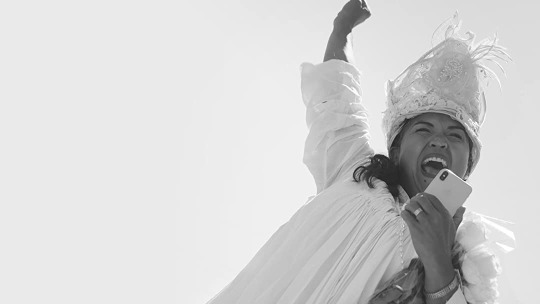
39. Time (Garrett Bradley)- The key to Time is that it provides very little context. Why the patriarch of this family is serving sixty years in prison is sort of besides the point philosophically. His wife and sons have to move on without him, and the tragedy baked into that fact eclipses any notion of what he "deserved." Feeling the weight of time as we switch back and forth between a kid talking about his first day of kindergarten and that same kid graduating from dentistry school is all the context we need. Time's presentation can be quite sumptuous: The drone shot of Angola makes its buildings look like crosses. Or is it X's?
At the same time, I need some context. When director Garrett Bradley withholds the reason Robert's in prison, and when she really withholds that Fox took a plea and served twelve years, you start to see the strings a bit. You could argue that knowing so little about why, all of a sudden, Robert can be on parole puts you into the same confused shoes as the family, but it feels manipulative to me. The film is preaching to the choir as far as criminal justice goes, which is fine, but I want it to have the confidence to tell its story above board.
38. Bloody Nose, Empty Pockets (Turner Ross and Bill Ross IV)- I have a barfly friend whom I see maybe once a year. When we first set up a time to meet, I kind of dread it and wonder what we'll have to talk about. Once we do get together, we trip on each other's words a bit, fumbling around with the rhythm of conversation that we mastered decades ago. He makes some kind of joke that could have been appropriate then but isn't now.
By the end of the day, hours later, we're hugging and maybe crying as we promise each other that we won't wait as long next time.
That's the exact same journey that I went on with this film.
37. Underwater (William Eubank)- Underwater is a story that you've seen before, but it's told with great confidence and economy. I looked up at twelve minutes and couldn't believe the whole table had been set. Kristen plays Ripley and projects a smart, benevolent poise.
36. The Lodge (Veronika Franz and Severin Fiala)- I prefer the grounded, manicured first half to the more fantastic second half. The craziness of the latter is only possible through the hard work of the former though. As with Fiala and Franz's previous feature, the visual rhymes and motifs get incorporated into the soup so carefully that you don't realize it until they overwhelm you in their bleak glory.
Small note: Alicia Silverstone, the male lead's first wife, and Riley Keough, his new partner, look sort of similar. I always think that's a nice note: "I could see how he would go for her."
35. Miss Americana (Lana Wilson)- I liked it when I saw it as a portrait of a person whose life is largely decided for her but is trying to carve out personal spaces within that hamster wheel. I loved it when I realized that describes most successful people in their twenties.
34. Sound of Metal (Darius Marder)- Riz Ahmed is showing up on all of the best performances of the year lists, but Sound of Metal isn't in anyone's top ten films of the year. That's about right. Ahmed's is a quiet, stubborn performance that I wish was in service of more than the straight line that we've seen before.
In two big scenes, there's this trick that Ahmed does, a piecing together of consequences with his eyes, as if he's moving through a flow chart in real time. In both cases, the character seems locked out and a little slower than he should be, which is, of course, why he's facing the consequences in the first place. To be charitable to a film that was a bit of a grind, it did make me notice a thing a guy did with his eyes.
33. Pieces of a Woman (Kornel Mundruczo)- Usually when I leave acting showcases like this, I imagine the film without the Oscar-baiting speeches, but this is a movie that specializes in speeches. Pieces of a Woman is being judged, deservedly so, by the harrowing twenty-minute take that opens the film, which is as indulgent as it is necessary. But if the unbroken take provides the "what," then the speeches provide the "why."
This is a film about reclaiming one's body when it rebels against you and when other people seek ownership of it. Without the Ellen Burstyn "lift your head" speech or the Vanessa Kirby show-stopper in the courtroom, I'm not sure any of that comes across.
I do think the film lets us off the hook a bit with the LaBoeuf character, in the sense that it gives us reasons to dislike him when it would be more compelling if he had done nothing wrong. Does his half-remembering of the White Stripes count as a speech?
32. Ma Rainey’s Black Bottom (George C. Wolfe)- This is such a play, not only in the locked-down location but also through nearly every storytelling convention: "Where are the two most interesting characters? Oh, running late? They'll enter separately in animated fashion?" But, to use the type of phrase that the characters might, "Don't hate the player; hate the game."
Perhaps the most theatrical note in this treatise on the commodification of expression is the way that, two or three times, the proceedings stop in their tracks for the piece to declare loudly what it's about. In one of those clear-outs, Boseman, who looks distractingly sick, delivers an unforgettable monologue that transports the audience into his character's fragile, haunted mind. He and Viola Davis are so good that the film sort of buckles under their weight, unsure of how to transition out of those spotlight moments and pretend that the story can start back up. Whatever they're doing is more interesting than what's being achieved overall.
31. Another Round (Thomas Vinterberg)- It's definitely the film that Vinterberg wanted to make, but despite what I think is a quietly shattering performance from Mikkelsen, Another Round moves in a bit too much of a straight line to grab me fully. The joyous final minutes hint at where it could have gone, as do pockets of Vinterberg's filmography, which seems newly tethered to realism in a way that I don't like. The best sequences are the wildest ones, like the uproarious trip to the grocery store for fresh cod, so I don't know why so much of it takes place in tiny hallways at magic hour. I give the inevitable American remake* permission to use these notes.
*- Just spitballing here. Martin: Will Ferrell, Nikolaj (Nick): Ben Stiller, Tommy: Owen Wilson, Peter: Craig Robinson
30. The Invisible Man (Leigh Whannell)- Exactly what I wanted. Exactly what I needed.
I think a less conclusive finale would have been better, but what a model of high-concept escalation. This is the movie people convinced me Whannell's Upgrade was.
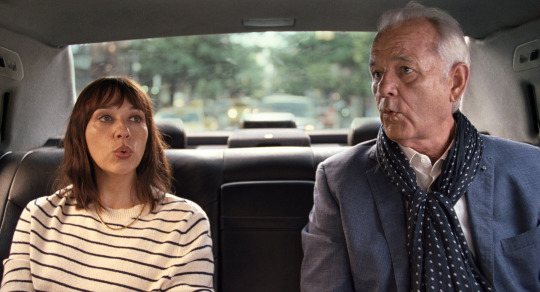
29. On the Rocks (Sofia Coppola)- Slight until the Mexican sojourn, which expands the scope and makes the film even more psychosexual than before. At times it feels as if Coppola is actively simplifying, rather than diving into the race and privilege questions that the Murray character all but demands.
As for Murray, is the film 50% worse without him? 70%? I don't know if you can run in supporting categories if you're the whole reason the film exists.
28. Mangrove (Steve McQueen)- The first part of the film seemed repetitive and broad to me. But once it settled in as a courtroom drama, the characterization became more shaded, and the filmmaking itself seemed more fluid. I ended up being quite outraged and inspired.
27. Shirley (Josephine Decker)- Josephine Decker emerges as a real stylist here, changing her foggy, impressionistic approach not one bit with a little more budget. Period piece and established actors be damned--this is still as much of a reeling fever dream as Madeline's Madeline. Both pieces are a bit too repetitive and nasty for my taste, but I respect the technique.
Here's my mandatory "Elisabeth Moss is the best" paragraph. While watching her performance as Shirley Jackson, I thought about her most famous role as Peggy on Mad Men, whose inertia and need to prove herself tied her into confidence knots. Shirley is almost the opposite: paralyzed by her worldview, certain of her talent, rejecting any empathy. If Moss can inhabit both characters so convincingly, she can do anything.
26. An American Pickle (Brandon Trost)- An American Pickle is the rare comedy that could actually use five or ten extra minutes, but it's a surprisingly heartfelt and wholesome stretch for Rogen, who is earnest in the lead roles.
25. The King of Staten Island (Judd Apatow)- At two hours and fifteen minutes, The King of Staten Island is probably the first Judd Apatow film that feels like the exact right length. For example, the baggy date scene between a gracious Bill Burr and a faux-dowdy Marisa Tomei is essential, the sort of widening of perspective that something like Trainwreck was missing.
It's Pete Davidson's movie, however, and though he has never been my cup of tea, I think he's actually quite powerful in his quiet moments. The movie probes some rare territory--a mentally ill man's suspicion that he is unlovable, a family's strategic myth-making out of respect for the dead. And when Davidson shows up at the firehouse an hour and fifteen minutes in, it feels as if we've built to a last resort.
24. Swallow (Carlo Mirabella-Davis)- The tricky part of this film is communicating Hunter's despair, letting her isolation mount, but still keeping her opaque. It takes a lot of visual discipline to do that, and Claudio Mirabella-Davis is up to the task. This ends up being a much more sympathetic, expressive movie than the plot description might suggest.
(In the tie dispute, Hunter and Richie are both wrong. That type of silk--I couldn't tell how pebbled it was, but it's probably a barathea weave-- shouldn't be ironed directly, but it doesn't have to be steamed. On a low setting, you could iron the back of the tie and be fine.)
23. The Vast of Night (Andrew Patterson)- I wanted a bit more "there" there; The film goes exactly where I thought it would, and there isn't enough humor for my taste. (The predictability might be a feature, not a bug, since the film is positioned as an episode of a well-worn Twilight Zone-esque show.)
But from a directorial standpoint, this is quite a promising debut. Patterson knows when to lock down or use silence--he even cuts to black to force us to listen more closely to a monologue. But he also knows when to fill the silence. There's a minute or so when Everett is spooling tape, and he and Fay make small talk about their hopes for the future, developing the characters' personalities in what could have been just mechanics. It's also a refreshingly earnest film. No one is winking at the '50s setting.
I'm tempted to write, "If Andrew Patterson can make this with $1 million, just imagine what he can do with $30 million." But maybe people like Shane Carruth have taught us that Patterson is better off pinching pennies in Texas and following his own muse.
22. Martin Eden (Pietro Marcello)- At first this film, adapted from a picaresque novel by Jack London, seemed as if it was hitting the marks of the genre. "He's going from job to job and meeting dudes who are shaping his worldview now." But the film, shot in lustrous Super 16, won me over as it owned the trappings of this type of story, forming a character who is a product of his environment even as he transcends it. By the end, I really felt the weight of time.
You want to talk about something that works better in novels than films though? When a passionate, independent protagonist insists that a woman is the love of his life, despite the fact that she's whatever Italians call a wet blanket. She's rich, but Martin doesn't care about her money. He hates her family and friends, and she refuses to accept him or his life pursuits. She's pretty but not even as pretty as the waitress they discuss. Tell me what I'm missing here. There's archetype, and there's incoherence.
21. Bacurau (Kleber Mendonca Filho and Juliano Dornelles)- Certain images from this adventurous film will stick with me, but I got worn out after the hard reset halfway through. As entranced as I was by the mystery of the first half, I think this blood-soaked ensemble is better at asking questions than it is at answering them.
20. Let Them All Talk (Steven Soderbergh)- The initial appeal of this movie might be "Look at these wonderful actresses in their seventies getting a movie all to themselves." And the film is an interesting portrait of ladies taking stock of relationships that have spanned decades. But Soderbergh and Eisenberg handle the twentysomething Lucas Hedges character with the same openness and empathy. His early reasoning for going on the trip is that he wants to learn from older women, and Hedges nails the puppy-dog quality of a young man who would believe that. Especially in the scenes of aspirational romance, he's sweet and earnest as he brushes his hair out of his face.
Streep plays Alice Hughes, a serious author of literary fiction, and she crosses paths with Kelvin Kranz, a grinder of airport thrillers. In all of the right ways, Let Them All Talk toes the line between those two stances as an entertaining, jaunty experiment that also shoulders subtextual weight. If nothing else, it's easy to see why a cruise ship's counterfeit opulence, its straight lines at a lean, would be visually engaging to Soderbergh. You can't have a return to form if your form is constantly evolving.

19. Dick Johnson Is Dead (Kirsten Johnson)- Understandably, I don't find the subject as interesting as his own daughter does, and large swaths of this film are unsure of what they're trying to say. But that's sort of the point, and the active wrestling that the film engages in with death ultimately pays off in a transcendent moment. The jaw-dropping ending is something that only non-fiction film can achieve, and Johnson's whole career is about the search for that sort of serendipity.
18. Da 5 Bloods (Spike Lee)- Delroy Lindo is a live-wire, but his character is the only one of the principals who is examined with the psychological depth I was hoping for. The first half, with all of its present-tense flourishes, promises more than the gunfights of the second half can deliver. When the film is cooking though, it's chock full of surprises, provocations, and pride.
17. Never Rarely Sometimes Always (Eliza Hittmann)- Very quickly, Eliza Hittmann has established herself as an astute, empathetic director with an eye for discovering new talent. I hope that she gets to make fifty more movies in which she objectively follows laconic young people. But I wanted to like this one more than I did. The approach is so neutral that it's almost flat to me, lacking the arc and catharsis of her previous film, Beach Rats. I still appreciate her restraint though.
GREAT MOVIES
16. Young Ahmed (Jean-Pierre Dardenne and Luc Dardenne)- I don't think the Dardennes have made a bad movie yet, and I'm glad they turned away from the slight genre dipping of The Unknown Girl, the closest to bad that they got. Young Ahmed is a lean, daring return to form.
Instead of following an average person, as they normally do, the Dardenne Brothers follow an extremist, and the objectivity that usually generates pathos now serves to present ambiguity. Ahmed says that he is changing, that he regrets his actions, but we never know how much of his stance is a put-on. I found myself wanting him to reform, more involved than I usually am in these slices of life. Part of it is that Idir Ben Addi looks like such a normal, young kid, and the Ahmed character has most of the qualities that we say we want in young people: principles, commitment, self-worth, reflection. So it's that much more destructive when those qualities are used against him and against his fellow man.
15. World of Tomorrow Episode Three: The Absent Destinations of David Prime (Don Hertzfeldt)- My dad, a man whom I love but will never understand, has dismissed modern music before by claiming that there are only so many combinations of chords. To him, it's almost impossible to do something new. Of course, this is the type of thing that an uncreative person would say--a person not only incapable of hearing the chords that combine notes but also unwilling to hear the space between the notes. (And obviously, that's the take of a person who doesn't understand that, originality be damned, some people just have to create.)
Anyway, that attitude creeps into my own thinking more than I would like, but then I watch something as wholly original as World of Tomorrow Episode Three. The series has always been a way to pile sci-fi ideas on top of each other to prove the essential truths of being and loving. And this one, even though it achieves less of a sense of yearning than its predecessor, offers even more devices to chew on. Take, for example, the idea that Emily sends her message from the future, so David's primitive technology can barely handle it. In order to move forward with its sophistication, he has to delete any extraneous skills for the sake of computer memory. So out of trust for this person who loves him, he has to weigh whether his own breathing or walking can be uninstalled as a sacrifice for her. I thought that we might have been done describing love, but there it is, a new metaphor. Mixing futurism with stick figures to get at the most pure drive possible gave us something new. It's called art, Dad.
14. On the Record (Kirby Dick and Amy Ziering)- We don't call subjects of documentaries "stars" for obvious reasons, but Drew Dixon kind of is one. Her honesty and wisdom tell a complete story of the #MeToo movement. Kirby Dick and Amy Ziering take their time developing her background at first, not because we need to "gain sympathy" or "establish credibility" for a victim of sexual abuse, but because showing her talent and enthusiasm for hip-hop A&R makes it that much more tragic when her passion is extinguished. Hell, I just like the woman, so spending a half-hour on her rise was pleasurable in and of itself.
This is a gut-wrenching, fearless entry in what is becoming Dick and Ziering's raison d'etre, but its greatest quality is Dixon's composed reflection. She helped to establish a pattern of Russell Simmons's behavior, but she explains what happened to her in ways I had never heard before.
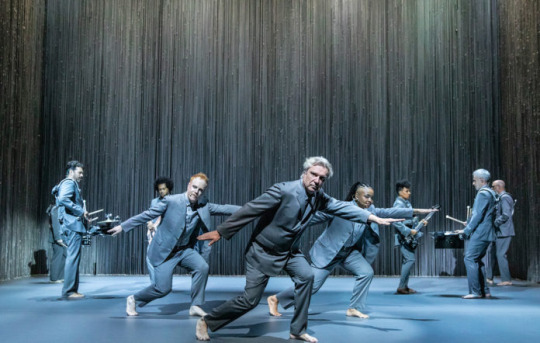
13. David Byrne’s American Utopia (Spike Lee)- I'm often impressed by the achievements that puzzle me: How did they pull that off? But I know exactly how David Byrne pulled off the impish but direct precision of American Utopia: a lot of hard work.
I can't blame Spike Lee for stealing a page from Demme's Stop Making Sense: He denies us a close-up of any audience members until two-thirds of the way through, when we get someone in absolute rapture.
12. One Night in Miami... (Regina King)- We've all cringed when a person of color is put into the position of speaking on behalf of his or her entire race. But the characters in One Night in Miami... live in that condition all the time and are constantly negotiating it. As Black public figures in 1964, they know that the consequences of their actions are different, bigger, than everyone else's. The charged conversations between Malcolm X and Sam Cooke are not about whether they can live normal lives. They're way past that. The stakes are closer to Sam Cooke arguing that his life's purpose aligns with the protection and elevation of African-Americans while Malcolm X argues that those pursuits should be the same thing. Late in the movie, Cassius Clay leaves the other men, a private conversation, to talk to reporters, a public conversation. But the film argues that everything these men do is always already public. They're the most powerful African-Americans in the country, but their lives are not their own. Or not only their own.
It's true that the first act has the clunkiness and artifice of a TV movie, but once the film settles into the motel room location and lets the characters feed off one another, it's gripping. It's kind of unfair for a movie to get this many scenes of Leslie Odom Jr. singing, but I'll take it.
11. Saint Frances (Alex Thompson)- Rilke wrote, "Perhaps everything terrible is in its deepest being something helpless that wants help from us." The characters' behavior in Saint Frances--all of these fully formed characters' behavior--made me think of that quotation. When they lash out at one another, even at their nastiest, the viewer has a window into how they're expressing pain they can't verbalize. The film is uneven in its subtlety, but it's a real showcase for screenwriter and star Kelly O'Sullivan, who is unflinching and dynamic in one of the best performances of the year. Somebody give her some of the attention we gave to Zach Braff for God's sake.
10. Boys State (Jesse Moss and Amanda McBaine)- This documentary is kind of a miracle from a logistical standpoint. From casting interviews beforehand, lots of editing afterwards, or sly note-taking once the conference began, McBaine and Moss happened to select the four principals who mattered the most at the convention, then found them in rooms full of dudes wearing the same tucked-in t-shirt. By the way, all of the action took place over the course of one week, and by definition, the important events are carved in half.
To call Boys State a microcosm of American politics is incorrect. These guys are forming platforms and voting in elections. What they're doing is American politics, so when they make the same compromises and mistakes that active politicians do, it produces dread and disappointment. So many of the boys are mimicking the political theater that they see on TV, and that sweaty sort of performance is going to make a Billy Mitchell out of this kid Ben Feinstein, and we'll be forced to reckon with how much we allow him to evolve as a person. This film is so precise, but what it proves is undeniably messy. Luckily, some of these seventeen-year-olds usher in hope for us all.
If nothing else, the film reveals the level to which we're all speaking in code.
9. The Nest (Sean Durkin)- In the first ten minutes or so of The Nest, the only real happy minutes, father and son are playing soccer in their quaint backyard, and the father cheats to score on a children's net before sliding on the grass to rub in his victory. An hour later, the son kicks the ball around by himself near a regulation goal on the family's massive property. The contrast is stark and obvious, as is the symbolism of the dead horse, but that doesn't mean it's not visually powerful or resonant.
Like Sean Durkin's earlier film, Martha Marcy May Marlene, the whole of The Nest is told with detail of novelistic scope and an elevation of the moment. A snippet of radio that mentions Ronald Reagan sets the time period, rather than a dateline. One kid saying "Thanks, Dad" and another kid saying, "Thanks, Rory" establishes a stepchild more elegantly than any other exposition might.
But this is also a movie that does not hide what it means. Characters usually say exactly what is on their minds, and motivations are always clear. For example, Allison smokes like a chimney, so her daughter's way of acting out is leaving butts on the window sill for her mother to find. (And mother and daughter both definitely "act out" their feelings.) On the other hand, Ben, Rory's biological son, is the character least like him, so these relationships aren't too directly parallel. Regardless, Durkin uses these trajectories to cast a pall of familial doom.
8. Sorry We Missed You (Sean Durkin)- Another precisely calibrated empathy machine from Ken Loach. The overwhelmed matriarch, Abby, is a caretaker, and she has to break up a Saturday dinner to rescue one of her clients, who wet herself because no one came to help her to the bathroom. The lady is embarrassed, and Abby calms her down by saying, "You mean more to me than you know." We know enough about Abby's circumstances to realize that it's sort of a lie, but it's a beautiful lie, told by a person who cares deeply but is not cared for.
Loach's central point is that the health of a family, something we think of as immutable and timeless, is directly dependent upon the modern industry that we use to destroy ourselves. He doesn't have to be "proven" relevant, and he didn't plan for Covid-19 to point to the fragility of the gig economy, but when you're right, you're right.
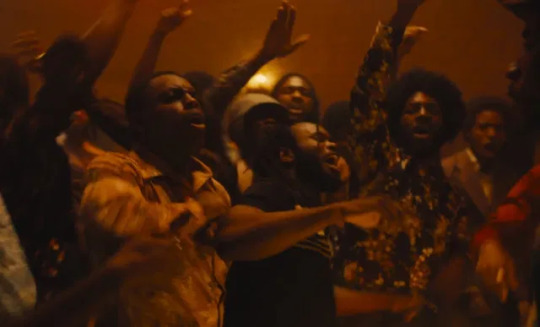
7. Lovers Rock (Steve McQueen)- swear to you I thought: "This is an impeccable depiction of a great house party. The only thing it's missing is the volatile dude who scares away all the girls." And then the volatile dude who scares away all the girls shows up.
In a year short on magic, there are two or three transcendent moments, but none of them can equal the whole crowd singing along to "Silly Games" way after the song has ended. Nothing else crystallizes the film's note of celebration: of music, of community, of safe spaces, of Black skin. I remember moments like that at house parties, and like all celebrations, they eventually make me sad.
6. Crip Camp: A Disability Revolution (Nicole Newnham and James Lebrecht)- I held off on this movie because I thought that I knew what it was. The setup was what I expected: A summer camp for the disabled in the late '60s takes on the spirit of the time and becomes a haven for people who have not felt agency, self-worth, or community anywhere else. But that's the right-place-right-time start of a story that takes these figures into the '80s as they fight for their rights.
If you're anything like my dumb ass, you know about 504 accommodations from the line on a college syllabus that promises equal treatment. If 2020 has taught us anything though, it's that rights are seized, not given, and this is the inspiring story of people who unified to demand what they deserved. Judy Heumann is a civil rights giant, but I'm ashamed to say I didn't know who she was before this film. If it were just a history lesson that wasn't taught in school, Crip Camp would still be valuable, but it's way more than that.
5. Palm Springs (Max Barbakow)- When explaining what is happening to them, Andy Samberg's Nyles twirls his hand at Cristin Milioti's Sara and says, "It's one of those infinite time-loop scenarios." Yeah, one of those. Armed with only a handful of fictional examples, she and the audience know exactly what he means, and the continually inventive screenplay by Andy Siara doesn't have to do any more explaining. In record time, the film accelerates into its premise, involves her, and sets up the conflict while avoiding the claustrophobia of even Groundhog Day. That economy is the strength that allows it to be as funny as it is. By being thrifty with the setup, the savings can go to, say, the couple crashing a plane into a fiery heap with no consequences.
In some accidental ways, this is, of course, a quarantine romance as well. Nyles and Sara frustratingly navigate the tedious wedding as if they are play-acting--which they sort of are--then they push through that sameness to grow for each other, realizing that dependency is not weakness. The best relationships are doing the same thing right now.
Although pointedly superficial--part of the point of why the couple is such a match--and secular--I think the notion of an afterlife would come up at least once--Palm Springs earns the sincerity that it gets around to. And for a movie ironic enough to have a character beg to be impaled so that he doesn't have to sit in traffic, that's no small feat.
4. The Assistant (Kitty Green)- A wonder of Bressonian objectivity and rich observation, The Assistant is the rare film that deals exclusively with emotional depth while not once explaining any emotions. One at a time, the scrape of the Kleenex box might not be so grating, the long hallway trek to the delivery guy might not be so tiring, but this movie gets at the details of how a job can destroy you in ways that add up until you can't even explain them.
3. Promising Young Woman (Emerald Fennell)- In her most incendiary and modern role, Carey Mulligan plays Cassie, which is short for Cassandra, that figure doomed to tell truths that no one else believes. The web-belted boogeyman who ruined her life is Al, short for Alexander, another Greek who is known for his conquests. The revenge story being told here--funny in its darkest moments, dark in its funniest moments--is tight on its surface levels, but it feels as if it's telling a story more archetypal and expansive than that too.
An exciting feature debut for its writer-director Emerald Fennell, the film goes wherever it dares. Its hero has a clear purpose, and it's not surprising that the script is willing to extinguish her anger halfway through. What is surprising is the way it renews and muddies her purpose as she comes into contact with half-a-dozen brilliant one- or two-scene performances. (Do you think Alfred Molina can pull off a lawyer who hates himself so much that he can't sleep? You would be right.)
Promising Young Woman delivers as an interrogation of double standards and rape culture, but in quiet ways it's also about our outsized trust in professionals and the notion that some trauma cannot be overcome.
INSTANT CLASSICS
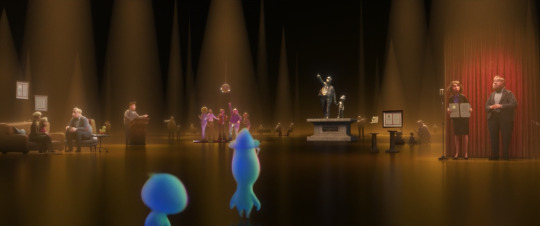
2. Soul (Pete Docter)- When Pete Docter's Up came out, it represented a sort of coronation for Pixar: This was the one that adults could like unabashedly. The one with wordless sequences and dead children and Ed Asner in the lead. But watching it again this week with my daughter, I was surprised by how high-concept and cloying it could be. We choose not to remember the middle part with the goofy dog stuff.
Soul is what Up was supposed to be: honest, mature, stirring. And I don't mean to imply that a family film shouldn't make any concessions to children. But Soul, down to the title, never compromises its own ambition. Besides Coco, it's probably the most credible character study that Pixar has ever made, with all of Joe's growth earned the hard way. Besides Inside Out, it's probably the wittiest comedy that Pixar has ever made, bursting with unforced energy.
There's a twitter fascination going around about Dez, the pigeon-figured barber character whose scene has people gushing, "Crush my windpipe, king" or whatever. Maybe that's what twitter does now, but no one fantasized about any characters in Up. And I count that as progress.
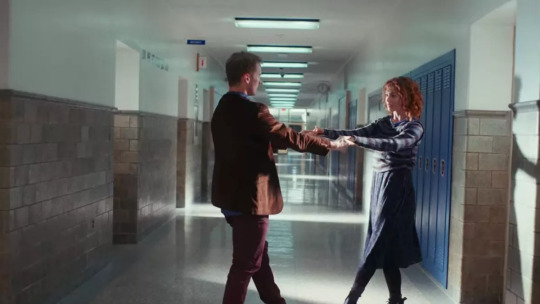
1. I’m Thinking of Ending Things (Charlie Kaufman)- After hearing that our name-shifting protagonist moonlights as an artist, a no-nonsense David Thewlis offers, "I hope you're not an abstract artist." He prefers "paintings that look like photographs" over non-representational mumbo-jumbo. And as Jessie Buckley squirms to try to think of a polite way to talk back, you can tell that Charlie Kaufman has been in the crosshairs of this same conversation. This morose, scary, inscrutable, expressionist rumination is not what the Netflix description says it is at all, and it's going to bother nice people looking for a fun night in. Thank God.
The story goes that Steven Spielberg and George Lucas, when constructing Raiders of the Lost Ark, sought to craft a movie that was "only the good parts" with little of the clunky setup that distracted from action. What we have here is a Charlie Kaufman movie with only the Charlie Kaufman moments, less interested than ever before at holding one's hand. The biting humor is here, sometimes aimed at philistines like the David Thewlis character above, sometimes at the niceties that we insist upon. The lonely horror of everyday life is here, in the form of missed calls from oneself or the interruption of an inner monologue. Of course, communicating the overwhelming crush of time, both unknowable and familiar, is the raison d'etre.
A new pet motif seems to be the way that we don't even own our own knowledge. The Young Woman recites "Bonedog" by Eva H.D., which she claims/thinks she wrote, only to find Jake's book open to that page, next to a Pauline Kael book that contains a Woman Under the Influence review that she seems to have internalized later. When Jake muses about Wordsworth's "Lucy Poems," it starts as a way to pass the time, then it becomes a way to lord his education over her, then it becomes a compliment because the subject resembles her, then it becomes a way to let her know that, in the grand scheme of things, she isn't that special at all. This film jerks the viewer through a similar wintry cycle and leaves him with his own thoughts. It's not a pretty picture, but it doesn't look like anything else.
8 notes
·
View notes
Photo

By Chance
Chapters 9-10
A misunderstanding gone viral puts you on BTS’s radar, which leads to a series of events that finally culminate with you meeting them for the first time.
✚ Pairing: Sub!BTS/Female Reader
✚ Word Count: 2.8K
✚ Rating: M
✚ Warnings: None.
✚ A/N: This is a work of fiction. Names, characters, businesses, places, events and incidents are either the products of my imagination or used in a fictitious manner.
Read on AO3 / Chapters 1-4 / Chapters 5-8

Chapter 9: The Guests
"Do you already know which artist is performing that day?" Your friend asks over the phone while you eat your toast with one hand and hold a script with the other. Reading it doesn't need your full attention, and based on what this movie seems to be about it doesn't look like it deserves it anyway.
"No, not yet." You reply absentmindedly, taking another bite of your toast while seriously contemplating just giving up on this script halfway through reading it. You doubt it's redeemable at this point. "It's in like a month anyway. They said they would tell me first before announcing it, though."
"This is so exciting!" She almost squeals, and you close the script before throwing it in the trash. You lost count of how many times it was written that the male protagonist couldn't keep his eyes from your cleavage. "I can't believe you're hosting again. I've been waiting for this to happen for years!" You can't help but laugh at her dramatics.
"It feels as surreal as the first time, honestly." You eat the last bite of your toast and pour yourself another glass of orange juice. You did enough freaking out to last a lifetime when you hosted the show for the first time a couple years ago, so this time you're excited but definitely not on the verge of a nervous breakdown like last time.
"Who do you think will be performing?" She asks, and you realize that you hadn't thought about that at all. "Oh my god what if it's BEYONCÉ?" She damn near screams that last part, and your brain immediately screams NO at that. You're still embarrassed at what happened last year, and you don't know when you'll be able to face her again without feeling mortified.
"Who knows?" You quickly reply. "Maybe it'll be like Ed Sheeran or something."
"Maybe." She responds, way less excited than when she thought Beyoncé was a possibility. "Anyways, tell me when you know, okay? My break is almost done so I gotta go."
"Will do. Bye, love you!"
"Love you too, bye!" You hang up and stretch your arms over your head, already feeling stressed.
What if it was Beyoncé? It would be the third time you see her and even though she was incredibly lovely when you apologized and explained what happened the first time you met, that did nothing to erase the embarrassment you still feel today. You don't really think she would perform in a regular episode with you as the guest either, but now you can't help but feel anxious about it.
They said they were going to tell you who the artist was in the next few days, so for now all you can do is wait and try to not overthink too much.
Easier said than done.

Three hours ago, taking a nap because it was raining and the temperature had dropped just enough for it to be perfect for sleeping had seemed like a great idea. It's not the first time you do it, the day called for it, and since you didn't have to work today it was okay to relax and rest for a bit considering that in a couple days you'll start shooting again.
Completely harmless.
Except it wasn't.
You wake up thanks to some very loud thunder, and you snuggle deeper into your covers to continue sleeping. Another thunder disrupts you again, so you decide to look at the time and see if it's even worth it to try and sleep some more. But instead of being greeted with the time once you turn your phone on, you're greeted with 50 missed calls and texts from over 30 conversations.
"What the fuck?" You mumble to yourself, rubbing your eyes to try and see a little better.
Around 30 of the missed calls are from friends, and the rest are from your publicist and agent. You scroll down the conversations until you reach the message you got first, and the name makes you think you might understand what happened.
SNL Producer.
2 hours ago.
Hello [Y/N]! I'm just writing you to let you know before we post it on social media, that the musical guest on your episode will be BTS. See you soon!
Well, now you have no doubt that's definitely it.
You read through the messages as fast as you can and manage to reply to several before you're interrupted by your publicist calling.
"Hi, sorry. I was taking a nap." You quickly say.
"Don't worry, I just wanted to let you know that the internet exploded two hours ago."
"Because of BTS?" You ask, pulling the covers off of you and sitting on the edge of your bed. "That's not news, it happens every other week."
"Well, yes, true—" She agrees. "—but we don't care about those times, we care about this now because it involves you." She pauses for a second. "Check what I just sent you." You remove your phone from your ear and put her on speaker before opening the message notification.
It's the screenshot of an Entertainment Weekly tweet.
Exclusive: @BTS_twt and [Y/N] will finally meet and we couldn't be more excited
4,5K replies, 190K retweets, 380K likes.
"How the fuck did that get so many likes?" You blurt out, eyes wide. Your hear your publicist laugh heartily.
"It's more now, actually. The screenshot is from 10 minutes ago. And it's because BTS retweeted it."
"Oh, right." You say, shaking your head at yourself. You should've known. "That makes sense."
"It would be even better if you had a twitter account yourself so you could retweet and even send them someth—"
"My mental health." You interrupt her, rolling your eyes as you fall back again on the bed. You've lost count of how many times she's tried to have you make new accounts already. "Remember how I had to start taking antidepressants because of social media?"
"Right, yeah. The mental health thing." She sighs. "You could always have someone manage them instead of yourself, you know."
"Yeah, and then I'd be constantly checking what's been posted and what people have replied to every post." You hate talking to her about this, because even though she's great at her job and mostly understanding, she still complains about what a loss it is that you're not on Instagram and Twitter.
"Fine. I'll drop it." She pauses for a second. "Anyway, the reason why I called is to know how much do you know about these guys."
"I know a bunch of their songs. I've been listening to that song they did with Nicki, Idol— it's so catchy and the video is so random but so great." You conveniently leave out the detail that the reason you like the video so much is because they look beautiful in those suits while simultaneously looking like the cutest human beings on Earth with their other colorful outfits— especially in those sweaters with cartoon characters and the ripped jeans. "I actually watched a bunch of their music videos back when the whole behind the scenes stuff happened." Moments from their Blood, Sweat and Tears music video pop into your mind, but you immediately redirect your thoughts elsewhere. That video makes you feel way too many things that you should not be feeling while talking to your publicist. "They're so talented." You quickly add, sincerely. "I was thinking about watching some interviews soon to see what they're like. I haven't really watched any of that."
"Good! I was going to tell you to do that. These guys are like a publicity machine. If they approve of you, their fans will like you."
"Weeell..." You say, grimacing a little. You're not so sure about that. "Either that happens or they see me as a threat to them and decide I'm not good enough to be near them, and get a hashtag calling me a demon trending first worldwide."
"Well, based on the replies to that tweet I think many of them are excited. The international fans at least, I don't know about their Korean fanbase."
"And also, do not call them a publicity machine. They're actual people, you know." You sigh. "And that's not the reason why I will try to know more about them. It would be disrespectful to meet them without knowing anything about them. And please, stop seeing artists as only publicity opportunities. I told you I hate that!"
"That's literally my job, love. And whatever your good person reasoning is, I don't care. Just do that." She pauses. "And now I have to leave you, because unlike you I actually have to work today. See ya." She hangs up before you can say anything, and you take a deep breath.
She can be a goddamn handful, but even when she acts without emotions she always does things the way you want them and is very accommodating. She's good at her job.
You finally get out of bed and walk to the kitchen, where you left your laptop. But before you can do anything, you have an incoming FaceTime call from your best friend. She must've just read your reply to her 50 angry texts because you didn't tell her who the guest artist was going to be on your Saturday Night Live episode before the rest of the world found out.
"Heeeeeeey." You say innocently once her face appears on screen.
"Why didn't you tell me?! I had to find out on Twitter!"
"Okay, to be fair, you found out before I did. I was dead asleep when the producer texted me." You leave the phone standing against a glass of water and open your laptop. "So I had no chance to tell you before they announced it."
"Ugh, fine." She groans, rolling her eyes. "Anyways, are you excited?"
"I haven't had a chance to feel anything. I woke up to a thousand texts and calls and then my publicist called me." You open Youtube and start typing BTS to see what suggestions pop up first.
"Oh right, cause you went viral again. People on Twitter lost their shit over it."
"Yeah but they always do when BTS does something so it's not like it's new." You reply, a bit distracted.
BTS on crack?
"Okay, yeah. That's true." She agrees. "What are you doing?"
"Homework." You reply, scrolling through the endless results you got after clicking BTS on crack.
"Alright then, keep your secrets." She jokes, shaking her head. "I have to go anyway, I'm going out tonight." You blow a kiss in her direction.
"Have fun!"
"I always do! Bye!" She hangs up as you open a video titled "bts being crackheads for 5 mins straight".
You only need to watch a couple minutes to realize what type of videos these are. You have seen a couple of yourself that are edited similarly, but they were titled "[Y/N] being chaotic in interviews" and another one about you being extra— and you'd thought they were very funny.
A recommended video catches your eye, because it has hundreds of thousands of views.
RUNBTS 1-23 Best Moments
You have no idea what it is, but judging by the amount of views and the tiny amount of dislikes, it must be something good.
Time to start watching.
Chapter 10: The Surprise
"Do you think he will be angry at us for keeping it as a secret?" Hoseok asks, ear pointed at the bathroom door. He's doing his best to listen if the shower is still running, which means that Jungkook is not coming out just yet.
"No, he'll be too excited to be angry." Namjoon replies, waving his hand dismissively. "Jimin, don't blurt it out as soon as he comes here." He warns him, and Jimin looks completely shocked, not to mention offended. He searches for the support of the other guys with his eyes, but he finds that they're all looking at him the same way Namjoon is.
"What? Me?" He asks, pointing at himself. "Why me?"
"You're a terrible liar when you're excited about something." Taehyung says, and Jimin just stares at him with an angry pout.
"I'm not." He says, crossing his arms.
"You are." Namjoon, Yoongi, Hoseok and Jin say at the same time. Jimin refuses to dignify that with an answer, so he just stays silent with his angry pout still in place.
"The shower stopped." Hoseok says suddenly, craning his neck to listen better— and everyone goes silent. Not too long after, they hear it opening and Jungkook comes out drying his hair already dressed for bed.
"What's going on?" He asks, stopping suddenly when he sees them all standing there in the most suspicious way possible.
"Nothing!" Jimin suddenly says, way more excited than they had told him he was allowed to look.
"Jungkook, when did you say [Y/N] was going to be on SNL?" Hoseok asks, trying to not give himself away with the tone of his voice.
"April 13, why?" He continues to dry his hair, looking at the boys with narrowed eyes. He doesn't know what they're trying to do, but based on that question it seems like it has something to do with you. Maybe they want to watch the episode with him, since they're going to be in America by the time it airs anyway.
"So, we didn't tell you this before it was truly confirmed because we wanted it to be a surprise..." Namjoon starts, and Jungkook stops his movements.
They can't be telling him what he thinks they're telling him, right?
There's no way.
"But we'll be performing on SNL on April 13." He finishes. The towel drops from Jungkook's hands, and he just stares at them with no clear expression in his face.
"I thought he'd be more excited." Taehyung whispers in a confused tone to Namjoon, who lifts up a finger in response, signaling for him to wait.
"Give him a sec—"
"WHAT?!"

After a lot of happy screaming, a half an hour long videocall to his parents and a big glass of warm milk to calm him down, Jungkook is finally sitting down on the couch with the rest of the boys so they can explain how things went down.
"Jimin-Hyung, I can't believe you didn't tell me." Jungkook says, shaking his head with a surprised smile.
"We wanted to keep it from him, too." Yoongi says. "But he listened to us talking about it and we had to let him in."
"It was really hard to keep it a secret!" Jimin complains. "Because I was so excited. But I did so well, didn't I?" The rest don't really pay attention to him, except for Namjoon, who nods and gives him a thumbs up. Jimin isn't pleased with so little praise, but he takes it anyway. It's better than nothing.
"Ah, I'm so nervous." Jungkook says, unable to stop himself from grinning even though his face already hurts from smiling so much. He brings his knees up to his chest so he can hide his face in them, suddenly blushing. Even after he explicitly heard you talking about them, you still feel so far away from them that it almost doesn't feel real that they're going to meet you in a month.
"She already said she wanted to meet us—" Jin adds casually, and Namjoon has to hold back a sigh of relief because he's finally talking about you without getting nervous two seconds later. "—so you've got nothing to worry about."
He's come a long way since his confession a few months ago— even if Namjoon and Yoongi are still the only ones who know about his secret— and that lifts a huge weight from Namjoon's shoulders. It means that it's less likely he'll become instantly flustered the moment they see you for the first time, because if Jin gets nervous because of you in front of the cameras, everyone will notice and then talk about it— and Namjoon is sure that is the last thing Jin wants.
It doesn't take them long to realize it's futile to try and talk about the logistics of their performance with Jungkook right now, because he's barely paying attention to them. His grin has remained steady and unmoving from the moment they told him they would perform on the same day you're hosting, and they know it's going to continue that way for the next few days.
He'll be able to focus again once the initial shock passes and he finally realizes that yes, this is actually happening.
They are going to finally meet you.

Long after everyone has gone to bed, Jungkook lies still awake in bed, fully aware that he's not sleeping any time soon. He's still feeling giddy with happiness; he can't believe that they're going to actually meet you, and in a place where they will actually get to spend time with you, at that. He will get to talk to you, to actually be close to you and maybe, if he's lucky and brave enough, he might even get to hug you.
He'd fantasized about maybe seeing you in an awards show one day, but this is so much better than anything he could've imagined.
April 13 can't come soon enough.

Thank you so much for reading! Comments, asks, whatever you like is more than welcomed!
#sub!bts#sub!idol#bts x reader#kim namjoon x reader#kim seokjin x reader#min yoongi x reader#jung hoseok x reader#park jimin x reader#kim taehyung x reader#jeon jungkook x reader#my work
166 notes
·
View notes
Text
Perspective: Eve Polastri and the invisibility of women’s pain
“[A woman] has to know how to love
know how to suffer her love
and be all forgiveness”
These are the final verses of the poem “Sonnet of the ideal woman” written by the acclaimed Brazilian poet Vinicius de Moraes, same guy that brought you Girl from Ipanema®. (Don’t start hum… too late). I remember reading this sonnet only once, but its last verses became branded in my mind like a curse. Society’s view of ideal womanhood is perfectly encapsulated in these three haunting lines. That is women’s purpose, not only for men but for humanity, her suffering frivolous in the face of the redemption to be brought forth through her selflessness. Anything else is egoistical, evil, and dangerous… for everyone. From Pandora in ancient Greece, to biblical Eve, to Flaubert’s Madame Bovary, to 90% of all horror movies ever, women are constantly warned of the dangers of curiosity and desire, which lead to destruction and death. Her redemption is to be a vehicle of someone else’s redemption, just like Virgin Mary redeemed biblical Eve by being the vehicle of humankind’s salvation. This narrative is so ingrained in our collective unconscious that it requires an immense effort to not let it slip into its familiar nest within our minds.
The biblical story of Eve’s fall from grace is arguably the most pervasive patriarchal myth to shape our patriarchal society, but if we unwrap its millennia of projections of male anxieties, the myth holds a kernel of universal truth: The flesh is weak. We are dangerously inclined to act on desire over reason by force so strong it is symbolized by the Devil: it possesses the mind. These impulses are irrational, reckless, primal and compelling. While Freud constructed much of his theory on the fascination of unconscious drives, I believe no one has said it better than W.H. Auden: “We are lived by powers we pretend to understand”. Our lives and livelihood depend on striking a fine balance between restriction and satisfaction of impulse, and to those who have ever fell in passion with someone or something, passion can be one of the most disruptive experiences of a lifetime. Thus, Eve’s myth carries layers of meaning both as we understand our nature and also as to how we project these anxieties onto womanhood.

Eve Polastri is not just Eve, she is Eve, she is the proverbial woman. She is morbidly curious, tempted by desire, gives in, and destroys the world around her. But Killing Eve is no cautionary tale, Eve Polastri Is not committing a forbidden sin against a narrative moral code which commands an imposed narrative punishment. Thus, Eve Polastri embodies and transgresses the biblical myth: she is the woman exploring her own impulses in her own story and becoming authentic through it– which makes her a remarkable character in her own right. At the core, the character is also us, a regular person urging to become whole, that sees in the metaphorical abyss of Villanelle’s indulgence a reflection of what she yearns: liberation. There is a courage to Eve, and we watch her entranced, because, whether we want to admit or not, we all fantasize about playing with fire. However, there can be a tacit perverted satisfaction in this story: we want Eve to fall from grace but when she does, we want to punish her for it, thus sublimating and reprimanding our own impulse, and falling back in the old narratives about womanhood.
In Season 1, Eve seemed to have been taken as a surrogate for the audience quite unproblematically, nevertheless when desire starts to show its ugly face in Season 2, part of the audience started to feel alienated from the character, and even antagonistic. Which is unfortunate, because her face off with Villanelle in the finale was arguably the most victorious, honest and cathartic moment of the character so far. Season 3 opens with a recluse Eve licking her wounds, trying to pull herself together any way she can, after all she suffered and all she learned. She changed and change is painful – in an abstract sense, violent as well. Her initial isolation was self-imposed by the character but as the season progresses Eve becomes more and more distant, which creates a parallel to how women’s suffering is perceived in real life.
Ironically, when Eve is shutting down from the world around her in the beginning of the season, she is more open to us than she will ever be in the remainder of the episodes. We are allowed to exist with the character through her painfully dull, mundane day-to-day, as the extent of her suffering manifests in the blunt messiness of her exterior life and her valiant effort to keep it together with the help of a budding alcohol and cigarette addiction. Eve is not a strong woman; she is a woman that claimed herself at a great cost. This cost was depicted with frustrating realism, just like in real life, once the thrill of the battle is over, it’s time to tend to the wounded, drag the corpses and count the dead. It’s inglorious. No wonder Eve literally and metaphorically hid, she burned the bridges with the world around her. How could she possibly explain what she went through and how could an outsider possibly understand? A question that mirrors the feeling of many a person, especially women, that entangled themselves in violent dynamics: Alienation and loneliness.
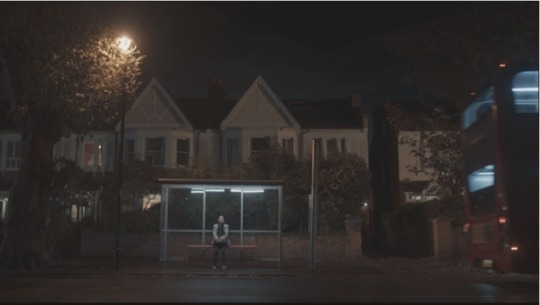
Initially, the character continues the apophatic self-definition, Eve says no a lot, symbolizing her efforts to reassert control over her life. From Villanelle, to Carolyn, to her job, Eve is trying to play by her rules and her truth, she knows what she wants not, but the interesting question posed at the end of Season 2 is “Now that Eve reclaimed herself, what will she do of what she has become?” – Sartre style. However, there is a major shift in Eve’s character after her interactions with Villanelle in episodes 3 and 4. The character’s arc becomes centered towards admitting her feelings for Villanelle as the source of conflict, however one could argue that the main source of conflict is the existence of these feelings itself. Therefore, merely admitting them shouldn’t solve the main conflict, on the contrary, due to their inherent contradictory nature it should exacerbate it.
This sleight of hand not only impoverishes the character’s emotional landscape, motivations and general arc, but also echoes the verse: ”A woman must know how to suffer love”. Like countless women before, Eve’s story is subtly telling us that the misery comes from her rejection of a phagic “love” and the metaphorical self-annihilation intrinsic to the experience, instead of the authentic ambivalence and paradoxes of the character’s inner self. Eve’s conflict should be at its core about herself not about Villanelle – who serves as a symbolic element. In the end, good women are expected to erase themselves and to become vessels of God and of others. Coincidentally, Eve’s character becomes oddly redeemed when she becomes a vessel for Villanelle’s need to belong.
Here is where the writers quite painfully abandon an once intriguing and compelling character. Eve doesn’t find nothing new to say about herself, no new path nor synthesis of her desires, and identity – which could and should have given Eve agency in renegotiating her dynamic with Villanelle, especially if it was to bring them closer. Eve ceases to be defined by her own inner conflict and becomes defined by her attraction to Villanelle alone. As Eve obsessively seeks Villanelle, who is in turn occupied with a story of her own, at no point the audience is asked to care about Eve’s suffering nor does the writers bother to interrogate the character about it, let alone let the character process it. Eve is deprived from exploring herself and facing her own pain, almost as if Eve was so devoid of individuality that the character itself is alienated from the obvious pain and conflict it should be experiencing. But nor Eve, nor any other character and, most importantly, nor the audience is asked to care. In the emblematic scene where Eve jumps into a dumpster to literally look for scrapes of Villanelle’s supposed affection as a way of reconnecting with her, no effort is made to reframe it or question the length at which the character lost itself, because no one cares. When in the finale, Eve, who is oblivious to Villanelle’s change of heart, is interrogated with a relevant question “Did I ruin your life? Do you think I am a monster?”, the character straightforwardly reassures the anti-hero at the expense of the rich internal conflict that should have been derived and fleshed out from these points, because no one cares.
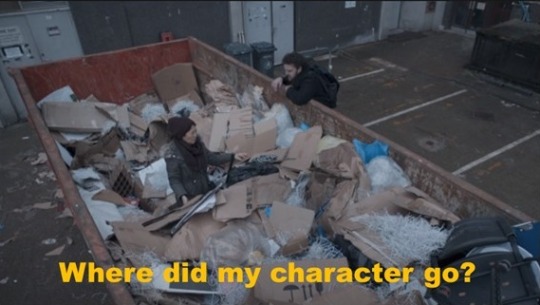
Eve believes in Villanelle unconditionally, despite all conceivable lines being crossed, despite the destruction and conflict this relationship has brought her, because Eve is doing precisely what her character is supposed to be doing: erasing her individuality, enduring her pain in the name of this love, forgiving no matter what they do to her so that they can be redeemed through her. “A woman has to know how to suffer her love and be all forgiveness”. Thus, Eve as a character becomes a device in Villanelle’s story arc occupying the same restricted space female characters were always allowed to inhabit. Villanelle goes on a somewhat muddled character growth arc, filled with redemption elements which traditionally involves the presence of a source of acceptance and love, generally in the form of a love interest, that will be granted to the hero at the end of the journey. Eve’s function in the story is not as a compelling protagonist with universal struggles, but as both enabler and trophy in Villanelle’s story. The narrative finds itself trapped in the old tales ingrained in our collective unconscious, in a jarring contrast with the previous seasons’ transgression and uniqueness.

Paradoxically, this precise abandonment gives the season the richest opportunity for the audience to interrogate the place of women’s pain. Eve’s abandonment mirrors the invisibility of the suffering of countless women, who painfully sacrifice their livelihoods in the name of their loved ones, be it Nicos, or Villanelles, or family, or friends, or their communities. Who, day in and out, are responsible for caring and supporting others through their struggles while left stranded with their own conflicts. After all, when so much depends on their self-sacrifice their pain is unimportant, even an expected part of this glorified martyrdom. Are we keen on looking at these women who inhabit these confined roles and acknowledge without judgement the enormous burden they carry? Are we ready to empathize with them when they rebel, when they fail and break, and even more so when they acquiesce? Having a queer twist on this narrative is not enough to claim it transgressive, as this cultural recipe perpetuates itself also into homoromantic relationships, as women often see themselves trapped in this dynamic with their female partners as well. Women are no less oppressed by patriarchal ideas of womanhood if these ideas are perpetuated through their relationships with other women.
Akin to Eve’s biblical story, the erasure of female pain is also layered, as we all crave unconditional love, and its redemption, so we can be at peace with ourselves – completely satisfied, accepted and safe – which is naturally symbolized by “The mother”. Therefore, it is easy to impose these fantasies in the ideal of womanhood, as easy as it is to relate to Villanelle and romanticize the role Eve plays in her development, her acceptance of Villanelle’s character being a powerful cathartic release for our own need and fantasies of belonging.
In this context, hidden in Season 3’s oblivious narrative, lays an interesting invitation to evaluate how we individually, and as a society, negotiate our urge to be nurtured and the necessity to nurture others and how these roles are culturally and socially informed by patriarchal ideas we collectively and individually carry about womanhood, and to what extent we are ready to challenge them.
#killing eve#killingeve#killing eve analysis#ke s3#ke#Eve Polastri#eve polastri retcon#killingeveperspectives#killinge#eve polastri analysis
20 notes
·
View notes
Note
no pressure if you're busy but i was wondering - is titans good? or is it more a show where you're like it's not /good/ but i like it? i thought it looked interesting but then everyone was so negative about it i kind of got put off. And then your (really excellent btw) video resparked why i thought it'd be interesting to watch in the first place. thanks!
I haven’t paid a ton of attention to what fans have said about Titans, although I’m aware that there’s a general negative vibe around it. I suspect that whether Titans is worth watching for you depends a whole lot on what you want out of Titans.
I went into the show having never read a DC comic in my life. I was coming off of a week-long Wikipedia binge on Batman and his associated characters—the Robins, the Batgirls, some dude named Signal—and was talking to @thirdblindmouse about how it had become overwhelmingly clear to me that we’ve been doing Batman all wrong for decades, and the way to tell the story is as an ensemble family drama about intergenerational trauma. And she was like, “Uh, have you seen Titans?” So all of my pre-existing understanding of the characters comes from Google and selected comics scans.
I suspect that the show’s interpretation of Dick Grayson, in particular, is... skewed? I’m almost certain, based on scans of comics I’ve seen/the half a season of Teen Titans I watched a lifetime ago, that its interpretation of Starfire is highly nontraditional. There are certain storylines that I know they’re adapting, but like, they are playing very loose with the adaptation of even some of the characters’ basic personalities. (I’m pretty sure—again, not really a DC comics fan!)
So if you’re very committed to a generally cheerful Dick Grayson, Titans will not give you that. If you have a vision of Batman as a generally decent man, Titans will really not give you that. In general, I think that the show would be better if it erred more towards a lighter tone for Dick—there are moments where he has shades of Quentin in season three of The Magicians, when Q was kind of endearingly hapless, and the show is better for it. But I think it earns its ambivalent stance on Batman, and uses it well. Batman in Titans looks and acts like your dad whose office you’re not allowed into. And Titans!Starfire is really amazing. Like, Anna-Diop-is-a-revelation, fuck-now-you’ve-got-me-shipping-against-my-will amazing.
The bigger issue that Titans has—and this is not unrelated to Dick’s characterization, I guess—is its relationship with violence. Titans is a really violent show, especially in its first season, and it’s off-putting. Pretty much every superhero show involves the heroes beating up bad guys; not every superhero show involves the protagonist mutilating someone in the course of a fight.
This is not unthinking hyperviolence. Titans (which is actually annoyingly pretty good about tracking character through action sequences) is trying to make a point: The compounding traumas of Dick’s childhood resulted in an explosion of rage. Batman funneled his anger into Dick; Dick funnels his anger into whatever bad guy he’s fighting. The show isn’t subtle about this idea. Dick says it out loud several times. Nor (after the first fight) does the show endorse Dick’s over-the-top violence. Everyone from Donna Troy to Dick himself remarks on it with, at minimum, concern. And over time, Dick’s fighting style changes; he consciously leaves the hyperviolence behind, until his final fight of season two is primarily evasive.
But Dick is not the only Titans character who is working out his rage on the criminals he apprehends, and the show is considerably less coherent in its tonal approach to other characters’ violence. Hank and Dawn—the masked hero team Hawk and Dove—have an origin story that plays out like the the backstory of a serial killer couple, their interlocking trauma and rage and grief finding expression and acceptance in each other. The show is aware of the dynamic, but it’s not clear that it’s aware of how disturbing it is. Hank and Dawn are, primarily, people who need to cause violence in order to be at peace in their own heads—and only secondarily, people who want to protect others from danger. Season two does do some work exploring this idea, but the exploration is confused by the fact that, in the end, the show wants both of them on the cast.
Which is kind of the problem with any superhero show that sets out to explore the ethics of superheroism—at the end of the day, the characters aren’t gonna retire to Wisconsin, you know? So Titans presents hyperviolence, presents it as problematic (sometimes), presents it as almost an inevitable consequence of traumatized teenagers deciding to pursue vigilante justice... and then builds a superhero team of traumatized teenagers and young adults. As is its basic conceit.
And on a more fundamental level, the hyperviolence just sort of makes the show feel very grim. It’s already an aesthetically dark show, a lot of the time, and then you’ve got people getting mutilated, and Batman’s an asshole and Dick Grayson’s got anger management issues, and it feels like the show’s grimdark.
I don’t think it is, though. First of all, despite everything, Titans actually has a sense of humor, both in general and occasionally about itself—I mean, it’s not Legends of Tomorrow, but it understands how to crack a smile every now and then. (They have a superdog. He shoots lasers out of his eyes!) But more importantly, at the end of the day, Titans is hopeful. Yeah, it’s a show about anger and violence and intergenerational trauma—but it’s more specifically about moving beyond those things. At its heart, it’s about being a better parent to your children than your parents were to you.
That central relationship between Dick and Rachel—Dick trying, and sometimes failing, but always caring and trying to be better for Rachel, and Rachel’s absolute fury with him when he fails, but her unshakeable devotion to him for being there, the unbelievable amount of sway he holds in her world—that’s what makes the show work for me. There are other vital relationships, too—Rachel and Kory, especially, but also all of the pseudo-familial relationships built up between all of the characters—but it all comes back to Dick and Rachel.
I mean, it’s a found family show. So much so that in season two, there are like, three separate speeches about how this is a family, not one of those stupid biological families, but a family we found, and isn’t that the important kind? And how grimdark can a found family show really be?
The other thing that might throw some people off—but which is actually one of my favorite things about the show—is the structure. If you take a look at the Titans episode list, you’ll see that roughly 75 percent of the episodes are named after a character or characters. Season one of Titans is basically about Dick, Starfire, Gar, and Rachel (Raven from the comics) traveling the midwest, picking up the people who will eventually form the main Titans team. When they encounter those people, they get a spotlight episode. So in episode two, “Hawk and Dove,” when Dick and Rachel lay low at Hank and Dawn’s, the episode starts out with an extended cold open, entirely disconnected from the main characters, just introducing us to Hank and Dawn as characters. Episode eight, “Donna Troy,” sees Dick go to visit his old friend Donna in Milwaukee, and... basically just hang out with her for half the episode, while the rest of the cast does plot stuff. Occasionally, these spotlight episodes stop the plot completely: Towards the end of season one, an episode ends on a cliffhanger. the next episode, rather than showing the outcome of the cliffhanger, is “Hank and Dawn,” an episode that flashes back to show the story of how Hank and Dawn met and became masked heroes. (There’s an in-episode device that eventually makes it clear why this story is related to the cliffhanger.) Season two uses the cliffhanger-into-a-flashback-spotlight-episode structure two more times, once with a character we’ve never met before.
I can see this being deeply frustrating to a viewer watching week-by-week (and I would not recommend watching Titans in that manner). And it’s certainly an unconventional way to structure a season of television. But honestly? I think it’s half of what I like about the show. The spotlight and flashback episodes are good—often some of the best the show’s produced. They don’t stop the plot for no reason; in season two, in particular, they provide context and backstory and characterization in a way that would be almost impossible to do, or to do so well, without the space of a full episode. They make the show more episodic than it would otherwise be—always a joy, in a television landscape full of 10-hour movies—and give it space to experiment with tone and genre. They make the characters richer, and the relationships more complex.
Does it slow down the plot? Absolutely. But Titans is not overflowing with complex plot, and I don’t really think it should try to. The plot of Titans hangs together juuuuuuuust enough to make the themes and characters and relationships work. It’s coherent—we’re not talking Teen Wolf, here—but it’s not brilliant, and honestly, that’s fine by me. But I suppose if you want your plot to be really good, this may not be the show for you.
Finally, I’ll say that Titans, though not what I would call a feminist show (it has a primarily male writing staff and I think it shows) does have a kind of surprisingly large female cast? I wanna say it’s five men, five women, by the end of season two? (Yeah, it’s a fucking enormous cast.) And the women have actual relationships with each other, ones that the show puts some effort into maintaining and remembering. I realize this is damning with faint praise, but honestly I’d just expected a show like Titans to not do that, and was prepared to ignore it, and was kind of pleasantly surprised when I didn’t have to.
In summary: I told my sister that Titans is 10% men in spandex standing on cars, 30% team as family, 30% intergenerational trauma, 20% an uncomfortable relationship with is own hyperviolence, and 10% Krypto the Superdog. I think that tracks. That show, despite having Anna Diop’s glowing presence, has a lot of flaws, but it also really worked for me on some soul-deep level. I am exactly on its wavelength.
I do not think that Titans is a fantastic television show, but I also don’t think it’s a very bad one. I think it’s generally competent show that is very interesting in some aspects, is weak in some areas, falls prey to some inherent trappings of its genre, is thoughtful about familial trauma, is not thoughtful enough about violence and criminal justice, has a lot of very compelling performances, is really poorly lit a lot of the time, pays a lot of attention to its visual language, kind of thinks Batman’s an asshole, and has Krypto the Superdog. It really worked for me; I can see why others might not be into it; it might work for you!
#thank you for giving me this opportunity to talk about titans#a show that has EATEN MY BRAIN#titans#meta
7 notes
·
View notes
Text
Tropes I’m so done with
- he’s only mean to her to push her away and keep her safe
ex: new moon, it sucks
- regular girl falls into the universe of her favorite characters
ex: most fanfiction, it often reads like a reader insert that doesn’t want to call itself that
- saved by the power of love
ex: the end of the hp books, can’t they just fight? why do we have to make it super philosophical about what love is
- we spent the whole time making you think the love we were building up to was this boy but it was actually her family because who needs men.
ex: frozen, why even bother putting in a romance
- evil step mother/father
ex: cinderella retellings (the original was fine but it’s overdone now)
- investing significant amounts of time in building a relationship between two characters only for one of them to leave for some higher purpose that, meta, actually ends up being really selfish and it cheapens the whole thing
ex: cap at the end of endgame or arya leaving sansa in game of thrones. its usually for some higher purpose like finally taking care of themselves after this long story but it often doesn’t fit with their characters or comes off selfish and wrong
- breaking the established rules of the universe as a means of inventing a new big bad for a story
ex: those witches who became vampires in vampire diaries. this is by far my most hated trope on this list and my most hated example. you made and defined a universe and retroactively breaking the rules of it is not only cheap but also if this were possible it would have changed tons of the story up to now
- adopted children on a quest to find their real parents and discover themselves, as if their adopted parents aren’t their parents or don’t matter
ex: a common trope in adult fiction where the adult finds out their adopted after their parents die and sets out to find their “real” parents. adopted parents are real parents.
- the prophecy of the chosen one
ex: hp or percy. i don’t mind a chosen one all the time because often you need a chosen one to kick start a story but why is there always some dumb prophecy
- this girl is actually an insane badass and the guy doesn’t know or realize despite all the evidence which makes him look like a useless moron, but you’re not supposed to think he’s a moron because then the girl wouldn’t be as cool so you’re supposed to believe he’s really smart but also really stupid somehow
ex: this one fanfiction i’m thinking of that i won’t share but also if you take away the “people don’t know it’s her” then this “ridiculously overpowered female assassin who’s level of skill literally doesnt make sense if you have a brain and understand how she and time works” trope is done all the damn time in ya specifically thinking throne of glass
- the vampire diaries effect. where antagonists are gradually weakened over the course of the story such that despite the fact that they were kicking the protagonists ass at the beginning they are somehow on par by the end despite the fact that neither of the characters have actually changed, typically as a means of making room for a newer, bigger bad
ex: it happens in vampire diaries all the time. also supernatural, though they at least do it well. it just wreaks of “oh we got renewed for another season when we didn’t think we would. looks like we need to invent a new bad guy instead of using plot to change circumstance to make this more difficult let’s just weaken the current baddie to the level of the hero so this new one looks even bigger than him”
- being expected to sympathize with characters who betray their friends if its part of some moral code
ex: there’s tons of examples of this but keeping in vampire diaries, how am I supposed to like bonnie in the early seasons when she’s constantly betraying her friends? like why do they even like bonnie anymore
-when the guy she’s known for five minutes wins the love triangle over the guy she’s known her entire life because somehow her five minutes struggling side by side with this new guy are infinitely more important than the lifetime she’s struggled side by side with the other.
ex: yes, the hunger games was hard on katniss and i guess i can see how she formed a bond with peeta through trauma even though she spent zero time with him in the arena until she magically found him at which point she was already acting super tight with him despite very little proper bonding time. but also katniss lived a super hard life that after over a decade together, would’ve absolutely cemented her forever team gale
- building a big showdown between heroes and villains only to knock out all but one on either side
ex: the last star wars movie was so stupid and this was just part of why.
21 notes
·
View notes
Text
Who is the protagonist in the new Star Wars trilogy, Kylo/Ben or Rey?
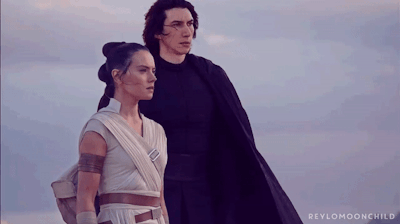
It’s something I’ve noticed after re-watching the movies finishing off with the rise of Skywalker. We start the series with Poe getting a map to Luke and being intercepted by Kylo Ren, our “antagonist”. Over the course of the movie we find out that he was Ben Solo, son of General/Princess Leia Organa and smuggler/war hero Han Solo, and that he has a personal stake in finding the map to Luke. In his attempts to get the map he meets Rey, a scavenger who’s recruited(?) into the resistance and he finds out that she’s strong with the force because of.....reasons (plot?) and tries to convince her to join his cause. We learn his backstory of how he was born to an absentee father and a workaholic mother, making him a child of neglect, and how he was strong with the force (both light and dark) since his gestation. His parents fear that he could be a new Vader and so they fear him and what he can be capable of, so they send him to boarding school with his uncle, effectively cutting off any parental affection during a delicate age, instead of...I don’t know having Leia train him and console him or Han reassure him....Like a normal parent would do. (I mean Kylo wasn’t Damien in the Omen. He didn’t kill anyone.)
So Ben is in Jedi boarding school and we learn that his uncle/teacher/parental figure grows to fear his potential and in a very unjedi move he contemplates and attempt to kill Ben, but before the blow could land, Ben wakes up, catches his uncle in his murder attempt and is able to block/retaliate in order to run away. He’s chased by the other students when Ben joined a sith like gang “The knights of Ren”. At the end Ben kills out of necessity and finds a sith master; Snoke, who teaches him the ways of the sith and helps him move on from his past to forge his own path. This is when he expresses his lack of agency and how even his name doesn’t feel like his own and takes up the name KYLO REN. Dun dun dun 🎵
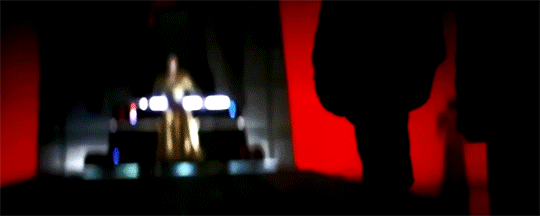
During the course of the trilogy Kylo learns that he’s just being used by Snoke and his ambitions to gain agency grow, making him want Rey to join him in an alliance that could truly powerful, she rejects his proposal but he still murders his master to save her, bumping him up to Supreme Leader. This isn’t a result of Kylo’s love for Rey, but more of his own emancipation from all his toxic parental figures; Han, Luke and Snoke. I don’t include Leia here because he still has a relationship with her, albeit an strained one. This type of relationship usually happens when your mom is the head of an opposing faction in a civil war. So Kylo ends up alone and is now the Supreme Leader of the self proclaimed first Order....

Now Kylo’s his own man, free from the influence of others; they can’t tell him what to do, now he’s free. His first order of business?? Track down oppositions in his own ranks and destroy anything that could challenge his position. Basically he wants to consolidate his power as the new Supreme leader. This brings him to search for Palpatine on Exegol to kill him and cement himself as his own authority. During this time Kylo learns that he was nothing more than a puppet to his master, who was, in turn a puppet for Palpatine, who’s been influencing and nudging Kylos path since he was a child, revealing that the character who is desperately looking to gain agency throughout the whole trilogy never had it. Palpatine offers him candy (I mean a naval fleet of star destroyers) and basically unchallenged control of the galaxy (ultimate POWA!!!!) The weird thing is that instead of killing Palpatine, even though he was aware his offers bullshit, he looks for Rey.....okaaay? Keep in mind that at this point Kylo is compelled towards Rey because of his natural curiosity of Rey’s potential while not having a single class in force usage and because he feels a kindred spirit in Rey’s loneliness and good nature. Is there some sexual tension there.....maybe? Then he tells her that they’re a dyad in the force as a way to explain their connection, which feels utterly forced (if you pardon the pun).

So Rey and Kylo meet in the water planet while Rey looks for a mcguffin and they fight, ending with Rey giving Kylo a cheap stab to the belly. Now Kylo’s being the superior fighter would’ve and should’ve won hands down by he senses/sees his mother through force Skype and he gets distracted enough to leave an opening. Rey heals his mortal wound, saving his life before leaving him presumably stranded there to die. Now, we’re expected to believe that because of her selfless intentions saving him, Kylo decides to forgive himself for his acts, including killing his biological father. He throws his awesome lightsaber into the ocean showing him abandoning of the sith or at least the dark side of the force and HE’S A GOOD GUY NOW!!! yay!! Whooo!! 😒

So he goes to Exegol, fights the knights of Ren and joins Rey in fighting Palpatine, gets his life force sucked, gets thrown down a pit, comes back out and then gives his life up to save Rey....okaaay? You can kind of see it from the whole, she saved her enemy and now her enemy is grateful and will repay his debt, hence Kylo sacrifices his life to save her; redeeming his character while having honor...so that angle works and when you look at it that way this is one of the few choices that Kylo makes that are truly his. It’s a waste of one of our most complex characters but sure...
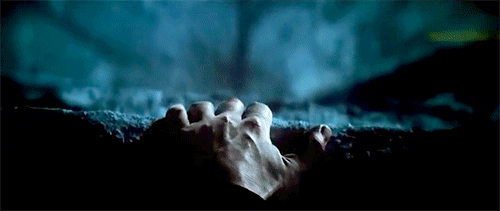
Now, after that whole rollercoaster, let’s talk about Rey. What do we know about Rey??
She’s a scavenger
She’s friendly and nice....so yay altruism.
She makes the best of what she has.
She was abandoned by her parents on Jakku and waits for them in vain...she knows this subconsciously.
She’s strong with the force because of....reasons
She looks to Han and Leia as parental figures because....reasons. Granted Leia started to train Rey, but it wasn’t that long so they barely know each other still.
Luke was her first master and he started to teach her about the force....for a bit.
Palpatine’s her grandfather via cloning.....Although this sounds like a really contrived way to explain her affinity with the force, and it sounds like they made it up on the spot. Plus, that’s not how cloning works!
She an amazing pilot and can fly anything, despite never having flown before the first movie because....reasons.
She’s a great mechanic who can fix anything, despite not being a mechanic but a scavenger....I mean I can take apart a computer, it doesn’t make me an IT genius/engineer.
She can fight with a lightsaber and has beaten Kylo Ren in combat twice, despite having no formal training and having never used a lightsaber before as opposed to her enemy who’s had decades of training and combat experience and studies, because......being strong with the force is like the matrix, so she automatically has the theory, reflexes and muscle memory needed for combat?
She joins the resistance not because she has an emotional stake in this, believes in the resistance’s cause, or has a grudge against the first order; it’s because....she had nothing better to do that day? The gave her free food?
And she’s a dayd in the force with Kylo Ren because.....Reasons. They never explain that it just is because Rey is the rarest thing in the whole universe apparently.
She spends a short amount of time training and reads the Jedi texts, and now she’s a full fledged Jedi at the end of the trilogy...because she’s Jesus? Like remember when Jedism and the ways of the force was a way of life and people spent lifetimes learning and training in the force? Remember how anakin was to old to train as a LITTLE BOY? Or how her enemy in combat has been trained/did studies in the force since he was a child, decades ago?

See how short that was compared to Kylo Ren/Ben Solo? Now, do any of these characteristics help you know Rey? They do a bit, but this is what we know about her, not of her. The problem with Rey as a protagonist is that she’s too bland; she has no negative aspects and, as a consequence, has no character arc to overcome. Kylo searches for emancipation from peoples expectations and to have agency, to be his own person under his freedom. Rey doesn’t change in the whole trilogy.
The only reason she’s even invested in the rebel cause or the people is because of the plot, because other characters (and hence the author) tell her she has to. As opposed to Luke who goes with Obi-Wan because he knew he was destined for something bigger, wanted to get out of Tatooine, and found out his father was a Jedi killed by our main antagonist, motivating him to be like the father he idealized but never met.
Thats’s 3 different motivations to help out Obi-Wan and the rebellion, right there. Rey was just bored, I guess.
So I started to think: “What if our main character is a tragic one like anakin? What if our protagonist is Kylo Ren and Rey is just a proxy for the audience?” I mean, it’s no secret that Kylo got his comic book series (that sold out) apart from becoming one of the most popular characters in the franchise. When you look at it that way, it does make sense; Kylo has a relationship with almost all of the main cast in the movie in one way or another and he’s the most compelling one; the one that changes and goes through a character arc. The most interesting thing about Rey is whether or not she’ll join the dark side. So as much as I hate to say this; Rey is obviously a Mary Sue
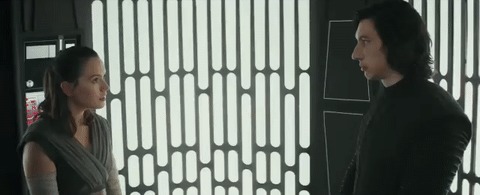
The problem here is that the creators didn’t know on who to focus, she so special and flawless that it’s makes her uncompelling and boring. And to add insult to injury they kill of our protagonist, not in the service of a greater cause or to save what he has left, but to bring back this bland sack of Jedi abilities. This isn’t to insult Daisy Ridley, if anything Disney and the writers did them a disservice. Kylo’s story was supposed to be the reversal of Vader, but in the end it was the same story, down to sacrificing himself to save the Jedi fighting Palpatine.
Now, am I anti-Reylo? Kind of, if we go by the movies. My problem is that Rey isn’t a compelling character, so I fail to get invested in her or to even care about her at all, and the sexual tension/kinship that she has with Kylo isn’t a Romance make. You could say “oh they’re a dyad.” That’s not romance, it’s just a bond; you can have a strong connection and not have romantic feelings. Their relationship is about as well executed as Anakin and Padme...and even THEY had conversations in their trilogy. The whole reason Kylo (I refuse to call him Ben at this point) turns good is love, selfless love. From who? The negligent parents that abandoned him, or the scavenger he barely know? Adam said in the documentary that he chose Rey because no one has shown kindness to him, so the moment she shows that kindness and performs a selfless act (which is really not selfless at all, considering she stabbed him while his guard was down) makes him turn good and choose her, he know that if he’s with her he’ll be alright....How is he gonna be alright? Is it because of her Mary Sue powers....If the writers took their time to develop their relationship, maybe we could have something here, but as it’s stands Kylo and Rey have as much romance as Edward and Bella; they have little in common, but god damn they can’t run away from one another! 😒 And that’s not even addressing the troubles of falling in love with someone actively trying to kill you/trying to win a war. So even IF they do have a well developed romance to ship, Rey (being the good guy she is) has drank the Jedi cool-aid so much that it boarders on fanatism and she won’t even consider Kylo’s side or choose an alternative path. If anything Rey could’ve died saving the galaxy, making her a martyr and having Kylo left to forge his own path; not as sith or as a Jedi, but something in between.
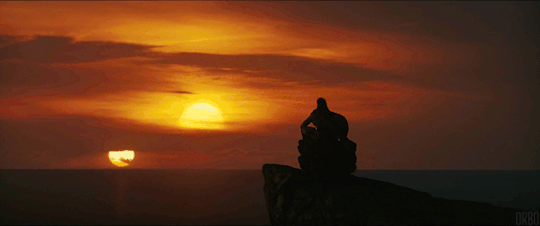
So what do you think? I know this has been discussed to death but still...How would you improve the new trilogy? Let me know.
Thanks for coming to my TED talk 😘
#star wars#star wars the force awakens#star wars the last jedi#star wars the rise of skywalker#kylo ren#ben solo#rey palpatine#Rey#reylo#emperor palpatine#adam driver#daisy ridley#snoke#supreme leader snoke#armitage hux#han solo#luke skywalker#leia organa#ben organa solo#the first order#the rise of kylo ren#the rise of ben solo#bendemption#adam driver edit#the last jedi#rise of the skywalker#force awakens#my random thoughts
25 notes
·
View notes
Text
People What Aint From Round Here Is The Problem...
So I just watched Once Upon a Time... In Hollywood and I have THOUGHTS:
Ive read a few reviews&ruminations on this film at this point and I can’t believe that none of them got(or at least, mentioned explicitly) the primary thesis of this movie, spcl given that Tarentino flatly states it out the mouth of his primary protagonist within, like, the first 15-20mins of the film: “...most important thing in this town is when you’re making money you buy a house in town. You don’t rent... Hollywood real estate means you live here. You’re not just visiting, not just passing through. You fuckin live here.” i.e., the most important thing in Hollywood, to Hollywood, is the people FROM Hollywood; Everyone else is just a filthy, trouble-making tourist or profiteer who is “Passing Through” and “Doesnt Get It” and “Is Fucking It Up”(It being the film industry), and probably “Secretly Hates Movies”. There are places and aspects of this movie that are basically a Nativist Angeleno rant, written by a life-long Angeleno film-nerd-turned-film-maker, against Hollywood’s critics(and his critics which he just totally conflates with the former), and probably non-Angelenos(and non-Californians?) in general.
There are two ways to read this thesis: Straight and Subverted/Satirized.
The evidence for reading it straight is pretty plentiful. Lots of reviews have puzzled at where the line connecting the constant hippie-bashing, the weird focus on knocking Polanski’s Polishness & preference for shooting in London, and the inexplicable pot-shot at Bruce Lee is, and I think this is it. “The Hippies” are repeatedly presented as a corrupting force: digging through trash, living in squalourous filth at the Spahn Ranch dragging members of “Old Hollywood” like its owner into it with them, selling drugs, and using sex to “control” men. And attached to this is presenting “The Hippies” as foreign; not only from another place, but refusing to assimilate with the LA way of life and hostile to it. The Manson family are the only explicitly identified “Hippies” in the film(other than, possibly, the one who sells Cliff an acid cig). The only “positive” portrayals of Bruce Lee in the film are silent ones of him teaching anglos kung fu, which has some fairly obvs and well-understood Implications.
But there’s also good evidence for reading it as subverted and satirized. Both Tate and Dalton are NOT from California, let alone LA, and Booth’s origins are left unclear. Dalton’s the only one of them explicitly id’d as being from elsewhere(Missouri), but Tate’s easy to google and she was a military kid who grew up all over the place. When Dalton returns from Italy, that sequence and his look in it are VERY reminiscent of the scenes introducing Polanski at the beginning of the film. The side-characters around Tate, perennially shown in a positive light, are also non-Angelenos. Doing Spaghetti Westerns revitalizes Dalton’s career, despite his disdain for Italian cinema. Tate and her crew, while not explicitly ID’d as “Hippies” and often shown in Mod and other fashion styles, are also presented in “Hippie” fashion, shown listening to “Hippie” music, smoking the “Hippie” Reefer(Im sorry, but Comedy Demanded this phrasing and I am Devout u_u), and implied to be living a polyamorous “Hippie” life.
It really is difficult for me to say which predominates. On the one entirely metaphorical hand, the ways in which Dalton’s Angeleno chauvinism are subverted and mocked are fairly obvs, but on the other emh, the film is FILLED with LITERALLY GLOWING nostalgia for this pre-Hippy, pre-Lefty, pre-70s, Conservative and Republican California&Los Angeles. Dalton’s focus on property-ownership&the film industry in the opening thesis could easily be seen as resolving these subversive contradictions to allow for a straight read(ie: Tate, Booth, and Dalton are “Hollywood People” who’ve both bought real-estate in LA, and who’ve grown up in film or film-adjacent fields and choose to center their adult lives in the film industry). So much, in fact, that I kinda started to wonder abt QT’s politics while watching it. And, if it WAS satirical, then what’s the point of the knock to Bruce Lee and focusing criticisms of Polanski on his Polishness and shooting in London? Is that just meant to characterize Dalton and Booth as nativists and racists?
It really cannot be said enough that there are REALLY MORE APPROPRIATE CRITICISMS to make of Polanski than 1)begin Polish, 2)possessing boyish effeminacy, and 3)preferring to shoot movies in London instead of LA. Which are this movie’s only problems with him(though it also takes the time to show him bitchily smoking a cigarette in an evening gown while being rude to a dog). Obvsl I dont object to villainizing an ACTUAL REAL LIFE VILLAIN like this shitstain, but I DO object to being asked(albeit gently) to participate in this film’s understated nationalist bigotry.
It’s possible that Cliff’s turning Pussycat down during the drive to the ranch was intended to be this but I highly doubt it. And if it was it’d be misrepresenting Polanski’s misdeeds enormously, considering that Pussycat, the too-young girl, is the sexual instigator in this film. Polanski liked to manipulate, drug, and rape underaged girls(he pulled the same shit with models in Europe before getting busted for it in LA, btw, then continued doing it after fleeing back to Europe); really not the same situation.
There’s another irony in that, while the film goes out of its way to call Polanski “boyish” and imply that makes him feminine and that this is Bad, there’s also a subtle under-current that... Tarentino sees himself in his youth the same way? He’s certainly never been short like Polanski and Jay Sebring are/were, QT’s 6 1, but the actors he cast to play them and the description made of the pair in-film are more than a bit reminiscent of how Tarentino looked&was discussed in the press back in the 90s when he was starting out. AAAaaand the film explicitly calls that Tate’s “Type”; leaving me with the question: would Tarentino be able to stop himself from implying a dead starlet would have been attracted to him? I leave the answer to your imaginations, Dear Readers u_u
Having said all that it IS a really good film, which I liked, I dont think it’d be very hard to set aside this political stuff while watching, the driving sequences are especially emotive&exhilarating, and there’s some seriously great acting in it. IDK if I’d say I liked it more than the recent Emma movie, tho.
I feel like each of the trio, Tate, Dalton, and Booth, were meant to symbolically Embody LA/Hollywood/California? Like Pitt especially seemed to be channeling movie characters and CJ from GTA: San Andreas throughout his performance, while I couldnt help but think of Ronald Reagan watching DiCaprio(spcl given the character’s likely politics). So there’s this sense in which the film is a fantasy of “Old Hollywood”, embodied by these three, Vanquishing its “Enemies”, represented by The Hippies(moralizing, pretentious, gross leftist) and potentially Polanski&Lee(foreign film ppl who refuse to integrate into the LA scene). Again, given the political history of Cali after this era, this embodiment raises some questions for me abt the film and QT’s politics(particularly in re: misogyny and feminism).
Also DiCaprio is totally going to get pitched a Reagan biopic off of this role and I sincerely hope he has the good sense to turn that shit the fuck down.
Circling back to the ranting at his critics, this movie was definitely and consciously a response to them. Like: up until the last 5-15 minutes of the film, and aside from a handful of too-lingering too fetishistic too on-the-nose creep shots of the female cast that Tarentino simply could not stop himself from making, OUATiH is precisely the sort of “Serious” film Tarentino’s critics have been saying he should make for decades now(of course he did Jackie Brown, which was that and which he blew Completely out of the park). And then there’s that bloody, gross-out, exploitation-movie ending. I dont actually think it was as bad as many critics were saying it was? For some reason I was thinking there was gonna be a massacre of the ENTIRE Manson family, which would have been totally out of left-field. But it WAS clearly a stinger of a major tone-shift thrown in as a Fuck You to the ppl who’ve called out his violent and exploitative preferences throughout the years. As for me I generally like his movies and think he’s a great filmmaker but he absolutely does go too far sometimes.
Rick Dalton, in an evening-gown, with a mixer full of iced-margarita in one hand, getting all up in the face of the driver of a loud exhaust-spewing jalope in his PRIVATE STREET was TOTALLY Tarentino himself :| By which I mean NOT ONLY that That’s ABSOLUTELY the sort of cameo he would have given himself 30 years ago and if it made any sort of sense at all in the film(which here it wouldnt have, obvsl), BUT ALSO that I feel 94% confident that Tarentino has actually done that at least once in his lifetime :| :|
I think the monologue&interactions T gives Bruce Lee leading up to the fight were probably more insulting to him than the fight itself. Contrary to popular discussion, it isn’t Pitt’s character totally trashing Lee, he gets in one good throw after Lee repeats a successful attack at his request(which I doubt Lee would have ever done from what little I know about him; not being predictable in a fight was his whole Deal), but rather an even duel between them(most of the fight is just the two blocking each others’ attacks). I dont think the film was trying to say “Lee was full of hot-air”, if it wanted to say that it’d have shown him getting trounced instead of showing him knock Booth down then trade him blow for blow, but more “Lee was pretty arrogant and a bit pretentious”.
OK, that’s abt all that I can think of right now: thanks for reading ^v^
#Once Upon a Time... In Hollywood#Quentin Tarentino#Long Post#Cinema#zA Reviews#Movie Reviews#zA Commentary#zA Opinions#analytic posts
5 notes
·
View notes
Text

Life in a Year (2019) dir. Mitja Okorn
summary:
The movie follows 17-year-old Daryn who finds out that his girlfriend is dying. He sets out to give her an entire life in the last year she has left.
1/5 stars
For a moment, I worried I was being too hard on this movie, but honestly it doesn’t really matter. Spoilers, duh, but just don’t bother watching.
This movie is like if you took all of John Green’s favorite tropes (manic pixie dream girl, guy with hidden passion who claims his life only starts to have meaning once he gets a girlfriend, and of course, someone who’s dying) and combined it with every indie startup movie’s director’s favorite tropes (pressure to attend a prestigious college— directors definitely projecting their own childhoods here— from unbelievably toxic parents who were forgiven too easily, the main character’s secret quirky side passion, and dates where the MPDG shows the protagonist what “life is really all about—the journey and love”) in order to create this monstrosity of a cliche.
The main character is a pretentious dork with a secret passion for rapping. His parents, particularly his father, have an ideal life planned out for him. A 10-year plan, if you will. This movie follows his path through his senior year of high school as he meets a girl who teaches him how to stand up to his dad and follow his passion. I genuinely thought I was going like him, but alas, nay. Already, I disliked the overused trope that a love interest had to come into his life in order for him to be inspired to stand up to his parents, since nothing remarkable changes after Isabelle comes into his life, except for the fact that she’s there and “she’s different than other girls.”
The idea of “living a whole lifetime in a year“ seemed so unrelated to the topic of parental pressure to do well in schools, the topics were tied together with threads that were as close to snapping as my patience throughout the movie, and neither were particularly well-developed or expanded on beyond anything we could find in a contemporary YA novel from 2011.
I was frustrated by the simultaneously extremely realistic depiction of Daryn’s friends as teenagers, and the terribly Disney-princess-happily-ever-after fact that Daryn believes (“knows”) that he is in love with Isabelle after knowing her for two scant months. We get scenes that are totally unrealistic and immature for a movie that follows two 17-18 year olds, like the MPDG throwing a rock at security to a supposedly famous musician twice and getting off scot-free.
I was extremely put off by how quickly paced the first third of the movie went by. Isabelle went from being pissed off at Daryn, to being impressed at his (frankly embarrassing) rapping, to agreeing on a “not-date” date where a Daryn insults the food they eat because it’s not Michelin 3-star A grade wagyu beef. After that, I could not shake the thought that Isabelle was a dumbass for not dumping him right there, because who calls a burrito a wrinkled ballsack at a place his date clearly enjoys and cherishes? Then again, seeing the folks Daryn was raised by, maybe it’s an inherited behavior.
Daryn’s father is one of those people who believes that just because he started from rock bottom and worked his way up to the top, he has the right to trust people like shit for not being just like him, including his own son. For fuck’s sake, he was more distraught when Daryn destroyed the wooden board containing his 10-year plan than he was after he almost punched Daryn. I’m not sure whether to call this a caricature of toxic parenting or a Frankenstein’s monster of abuse.
When Daryn trusts his father enough to bring Isabelle home to meet him, the dinner is wracked with passive aggressive comments like “Some people just aren’t meant for higher education.” It’s a wonder Daryn’s father wasn’t rejected from each promotion he applied to with his infuriating god complex and tendency to insult people he is merely supposed to be tolerating. When Isabelle (understandably) gets upset and leaves, Daryn’s dad mutters, “I hope you’re happy” under his breath to a Daryn. Failure to recognize that he’s fucked up and blaming others for his mistakes paints Daryn’s father as a manipulative narcissist.
Daryn’s father had such an undeserved redemption arc, and the fact that he came back to apologize to Daryn at his girlfriend Isabelle’s funeral was so aggravating that it could be nothing but expected from someone like him. Coming to apologize while Daryn was grieving manipulated Daryn’s trauma and made it so easy for his father to appear like a savior, a shoulder to cry on, and be forgiven. On Isabelle (MPDG if it wasn’t painfully obvious already)’s side of the story, her mother was also let off the hook way too easily. Isabel claims “she wanted to be a mother, just not my mother,” after she is told to leave by her mother and her new family. Isabelle’s mother comes back and apologizes only after she finds out that her daughter is dying. She clearly did not feel remorseful at shitting on her daughter’s emotions but was only feeling guilty that she was rude to a dying girl. She apologized because she was selfish and didn’t want her past actions to haunt her, not because she cared about her kid, which she clearly doesn’t.
This movie’s only redeeming feature was Cara Delevigne and Jaden Smith’s acting, and they both deserved better. When Isabelle died, I found myself appreciating Cara’s emotion and Jaden’s reactions, but a voice in the back of my mind kept listing off everything I found unsatisfactory. I most definitely was not crying along, and I barely registered what was going in, which is probably not the reaction you want your viewers to have.
The characters start off in exactly the same mental state as they begin. Not one character experiences a conscious, intentional shift to overcome the very things that caused their internal conflict, which is what is supposed to drive the entire story. You could argue that Daryn matures and becomes an independent being after fighting with his parents, but that’s not true. All he does is hide behind Harvard and scholarships, and when his dad embarrasses his girlfriend, he relies on the fact that he takes care of her deteriorating health to paint himself as a good boyfriend, instead of a coward who doesn’t stand up for anything he believes in, including a girl he supposedly loves (which let’s be real, sounds just like Daryn, doesn’t it?).
Overall, the entire story was cliché and every aspect that the producers believed made the story “unique” or even worthwhile to produce, in fact detracted from the entire appeal of the movie or lack thereof.
This movie, along with The Fault in Our Stars and Looking for Alaska, belongs in John Green’s personal closet of self-masturbatory material.
#amazon#film#review#ratings#lifeinayear#jaden smith#cara delevingne#movie#badmovies#high school#shitty#hanwatchingmovies#shittymoviereviews#shittymovies#film review#writing#my writing#spoilers#movie spoilers#romance movie#romance#love#funny
5 notes
·
View notes
Text
Major Character Death as a creative writing tool
I’ve always been interested in the craft of writing. I’ve been mulling over the way Major Character Death is used as a tool in fiction for awhile, and after watching the extremely problematic death of Quentin Coldwater, (and the self-congratulatory responses of the show’s producers who apparently believe they invented the concept) I thought I’d give you the the high school level compare and contrast MCD essay you didn’t really need or want.
Before I start, I want to be clear that MCD as a tool is not a bad thing by itself. Many, many fiction authors use it in a very calculated way, and as long as it serves the story well, they’re doing their job. Many essays and books about the craft of writing discuss its use because it is just another tool in the creative writer’s tool box. When done well, it makes you cry in a good way; when done badly, the death feels like a cheap gimmick to force an emotion without doing much work as a story teller. The latter is definitely what happened with the season finale of The Magicians.
If season 4 of the magicians had been a novel, it would have been sent back for major revisions before publication.
The first MCD that came to mind while watching the season 4 finale of The Magicians, wasn’t technically an MCD, but may as well be: the ending of the Golden Compass trilogy. The two protagonists have recently fallen in love, and make the difficult decision to return to never see each other again as a way to save the multiverse from the damage caused by traveling between worlds. They won’t even be able to contact each other, and will have to live out their lives as if the other had died.
It was incredibly painful to read (it’s the first book I cried over), but it was beautifully written and a very logical conclusion that the author set up from book one. The books are about (among many other things) the failures of adults and authority when they make selfish decisions, and by choosing to put the health of the universe above their own happiness, they made the bravest, most adult decision they could. It’s a message about the hope that younger generations can fix the things that their predecessors broke if they’re brave enough. The Magicians almost had a similar message.
The second MCD I thought of was that of “Wash” from Firefly. Like a lot of other fans of the show, I got angry at this death in the movie Serenity (essentially the series finale of the TV show). Wash was the comedic relief and voice of optimism in a dark and dystopic show. While Quentin was clinically depressed, and, in the words of Margo Hanson, ”moderately socially maladjusted”, he also acted as the voice of hope to his peers. Both characters were the emotional core of their shows, which was a big reason why they were chosen by their perspective creators as the deaths that would be most felt by the audience. They both got a funeral scene, to really drive home how much the other characters (and by extension, the audience) would be impacted by their death.
In Wash’s case, having his death be accidental impalement during a crash didn’t feel entirely satisfying or necessary. It felt like a lazy way to make the audience sad and motivate the rest of the characters to Really Get That Baddie… BUT, this cheapness is balanced by the symbolism of an outlaw pilot literally dying at the helm of the ship he loved while trying to save the world. It also didn’t send any problematic messages to the audience. Wash was not the protagonist or a “self-insert” the way Quentin was; he wasn’t suicidal or part of an underserved minority group (and make no mistake, by making Quentin sexually fluid/bisexual, the producers signed themselves up for a more thoughtful treatment of his death, if it had to happen.)
The message from Wash’s death is one that is very familiar to readers of genre fiction MCDs: simply: “not everyone lives” and “people who put themselves in high-risk situations sometimes die”. Both of which are painful but fair messages to absorb.
This same tactic was used again by Whedon with Agent Coulson in The Avengers. As an optimistic “plot-armor-free” side character who had become a fan favorite, he was given an entire arc in the movie that the audience wasn’t expecting, made to be even more loveable, and then killed off in a long emotional death scene which was then used in the third act turning point of the movie. Whedon made it clear in interviews that the whole death was coldly calculated to squeeze emotion from the audience, and up the stakes in a way that a large body count couldn’t. It upset a lot of fans, it wasn’t perfect, but it was well done and fitting for the narrative and made the movie stronger, and, again, he wasn’t a member of a minority group. (And as a side note, a different creative team knew how popular Coulson was and managed to resurrect him for his own TV show and managed to do it in a way that wasn’t flip-his resurrection had consequences that lasted at least until season 5, the current season).
There is no mitigating balance to Quentin’s death. He was suicidal from day one of the series, and he left via (a purposefully plausible) suicide. His first question, once he realizes he’s dead, is not, “Did the plan work?” or “is Eliot OK?” (the friend he’d been working so hard all season to save) or even “is Julia/Alice/Josh/all my other friends ok?” These are questions that would be plausible and fitting in a character who’s journey has about helping friends and the world out of tough situations. But no, the first thing he asks is “did I finally kill myself?”
With one sentence, his character returned to the self-centered, timid, low-confidence, suicidal mess he’d been established as within five minutes of the show’s pilot. He had no self-realization until after watching his own funeral, at which point he happily and peacefully goes to heaven. At best, that’s heavy-handed symbolism. At worst, it’s erasing all of his character growth and making his entire story pointless, while sending the very dangerous message to the audience.
The writers stated in interviews that they made his death all about suicide on purpose, and now (as of this writing) they continue to refuse to grapple with how problematic that is.
Another MCD that seemed to do the same thing was Tris from the Divergent series. Like Quentin, she was the protagonist. Also similar to Quentin, her arc was almost too on the nose: she was born into a clan literally named “Abnegation” and indoctrinated from birth to sacrifice herself for her community. She wasn’t even allowed to look into mirrors in case she caught even a smidgen of self-regard. And how does her story end? By her sacrificing her life to get the “big baddie” and save her friends and family.
Like Quentin’s death, a lot of her character growth appeared to be erased in the last few chapters of the book. Prior to Book 3, Tris had been learning to question her upbringing, to think for herself, that it’s ok to look for happiness for oneself, and that selfishness takes many forms, not all of them bad. When she makes the decision to kill herself in the end, it left a bad taste in my mouth. The plot didn’t require her death, (for example, there were other characters who could have gone in her place, and as a leader at that point, the more difficult decision probably would have been to send someone else on that mission and learn to live with the guilt). Her death and the manner of it, seemed to say, “just kidding, actually the only way to realize your self-worth is to is sacrifice your happiness and entire self for your community.”
Sound familiar?
Quentin Coldwater was just starting to learn (and because he had an audience, to teach) many of these same things. For three and a half seasons, we see him form strong friendships (when he thought he couldn’t); help people (when he thought he was useless), pursue romantic relationships (when he thought no one could love him); he lives an entire lifetime with Eliot during a quest on alternate timeline, where he’s shown having to make the difficult decision every day, to stay alive, to keep working on the tedious and almost hopeless task of completing the puzzle to finish a quest, and then it turns out that the answer to the puzzle all along WAS that daily struggle. Later, in season 4, he tells us that he hopes to be a dad (again) someday; he shows more and more confidence in his magical abilities every season. All of that was erased by the way his death was written.
Even with the uneven messaging of Tris’ death, there is at least lots of room for interpretation. I believe the author was trying to show her final sacrifice as a way of reclaiming part of her upbringing that wasn’t toxic. The character went through a rebellious phase during book one, during which she seems to reject all parts of her former life, even the good ones, right after leaving the Abnegation community for the hedonistic clan of Dauntless. It would definitely be good growth for her, as part of self-actualization, to accept the good parts of her upbringing. I don’t necessarily believe that’s the message we get at the end, but we at least have the possibility. Not everyone has reacted negatively to the way Quentin’s death was handled, so maybe there is more possibility of interpretation than what I see. I’m willing to be proven wrong, but nothing I’ve seen from critics or the showrunners statements has yet convinced me.
Another (highly speculative), parallel I couldn’t help but make over the last few days, is between the Magicians showrunners’s treatment of this MCD and Joss Whedon of a decade ago. His recent fall from grace has finally allowed more critical examination of his past works, but I remember how, at his peak, he could do no wrong. He was the voice of hollywood feminism. He was lauded by critics, peers, and fans. Any voice that questioned him was mocked, dismissed, and even harassed. Anyone else remember when critics call “Dollhouse” a feminist show? None of that has not aged well, has it?
The Magicians producers, riding high off of critical acclaim of Quentin’s homosexual romance in Season 3x05, had ample chance to make the braver choice: to allow a queer suicidal boy make the choice to keep fighting every day despite how hard it was; To break rank with 99% of other TV shows and allow his homosexual romance to be explored and given the same consideration as the hetersexual romances. Instead, they made him kill himself and be happy about it, literally saying in interviews that he had nothing left to live for. Without even addressing his feelings for Eliot. They buried yet another gay, all in the name of a shock-value gimmick, and they think they’re being “revolutionary” and that anyone critical of their choices is “just sad”.
There are about a thousand different ways season 4 could have gone that would have made the writers’ intended message less problematic, more impactful, and more satisfying, and none of them involve a MCD OR a trite “happily ever after”. Consider, for example, that Zelda could have completed her redemption arc in some kind of sacrifice similar to quentin’s. Everett was much more her “big baddie” than he was Quentin’s, it’s just strange that she never got to really confront her mentor-turned-enemy. Consider that, since Quentin’s main focus and motivation all season was to get Eliot back, that he actually succeeds, but, their reunion and relationship is strained. If we must push this idea that “magic comes from pain”, think how much more painful it would be to be to have Eliot finally confess his love to Quentin, but now Quentin is unable to pursue that relationship because of all the trauma he’s suffered at the hands of Eliot’s possessed body all season. Consider that he finally breaks under the strain and excuses himself from further questing, which would easily allow Julia, Kady, or Alice to get more screentime. (I mean, this is just stuff off the top of my head. For a hundred other ideas, check out Archive of Our Own).
They did just about everything wrong with this particular major character death, and I don’t think their choice is going to age well in the years to come.
#cw: suicide#cw: self harm#the magicians#spoilers#season 4#meta analysis#writing about writing#words about words#major character death#quentin coldwater#bury your gays
46 notes
·
View notes
Text
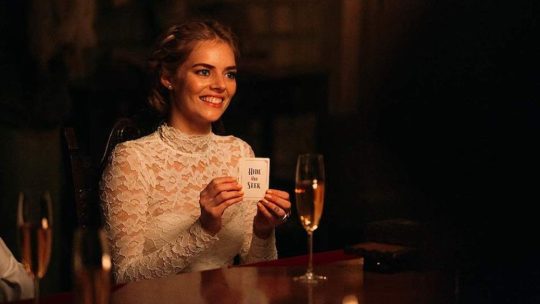
(Photo from the Variety review)
I'm so into Ready or Not that I could write fanfic about it. Fair warning, this film includes heavy gore and death and a few jump scares. Those usually put me off a horror film, but this was recommended by a friend. At this stage in my ongoing bad relationship with the horror genre, I only watch things people rec me.
This is good stuff. Really, really good stuff, falling strongly in the black comedy or horror comedy subgrenre. The thing that gets me about it; gets me until I'm sitting here composing a love letter to a horror movie in front of all of you, is the characterization.
You heard me. Characterization. In a horror movie.
This film is chock-a-block full of people who have clear motivations and backstory. You get why people are doing what they're doing. You get their struggles. Even the truly awful people - you get them too.
Grace, the unlucky bride who becomes the prey of a half dozen detached and desperate psychopaths, is the kind of protagonist you want from a horror movie. She's you, the person yelling at the screen through a lifetime of dumb jumpscare-driven cinema. Her progression throughout the movie, while not necessarily 'realistic' (because the situation itself is so ridiculous), comes across as both logical and human. Grace is tenacious. She's determined - first to impress this family she's always wanted, then to Not Die. She's a badass, but she's a badass who can be hurt and terrified and emotionally compromised, cry out of frustration and scream at the OnStar. Then she gets up, tears off her sleeve to bandage her hand, and gets back at it.
The writing in this film is excellent. It's clever, darkly funny, and gives away tiny, shiny pieces of motivation and backstory for every character no matter how incidental. It's like a horror D&D campaign devised by the best DM you've ever met. It never feels overburdened by exposition. There's just enough to move the story and no more, and it's broken up throughout the film. Every character is different and consistent, and the cast acts the hell out of it. Every character logically pursues their motivations. Every character with conflicting goals struggles with that. I mean, you wouldn't think that's a high bar, but in the age of streaming-exclusive churned out goreporn clogging the horror categories of Hulu and Netflix, it's higher than you think.
The set is beautiful. It walks the line between the candleglow warmth of an old house and the oppressive air of a labyrinthine medieval castle. There's little touches of displays and design that reflect the family fortune as game makers. The whole business creates an aura of a polished antique game box and drives the backstory home a little harder, with the something-isn't-right-but-ohgod-isn't-it-delicious vibe of electroswing and haunted old theaters.
The soundtrack is fabulous. Think Addams Family; a lush solid orchestral composition that swells and scurries and ratchets up the creep while also gorgeous as standalone classical music. The soundtrack is on Spotify, including the creepety-creep-creep-creep Hide & Seek Song and the hard rock version of Love Me Tender from the credits.
If that's not enough, the ending is satisfying and - as Variety puts it - explosively funny. It's the kind of ending I want from my horror but rarely get.
I can't recommend Ready or Not strongly enough. If you enjoy dark humor and can stand a few gore splatters; if you liked the underlying critique of humanity from Torchwood's Countrycide or Supernatural's The Benders, this film won't disappoint. People are the real monsters here. The worst part is, they know.
3 notes
·
View notes
Text
Taking Back Neverland--Chapter 2 of 10

Pairing: Captain Swan
Rating: G or a soft T
Summary: AU. After actress Emma Swan’s lead role in a popular TV show is at an end, she is offered the leading role in the Regina Mills film, Taking Back Neverland, a fresh retelling of the Peter Pan story. It’s a once in a lifetime opportunity. Only problem? She’ll be starring opposite Killian Jones, who she positively can’t stand. (Originally part of my Fluffy Fridays collection.)
Previous chapter: (1)
Notes: So this is an old story, originally written about 3 years ago as part of my Fluffy Fridays collection, but @kmomof4 made the amazing above pic-set for it as a birthday gift, (Thanks Krystal! It’s perfect!), and I decided it was time for a reissue. Enjoy!
~*~*~*~*~*~*~*~*~*~*~*~
Chapter 2
“You really should check out this script, mate,” Robin said, “it’s bloody perfect for you.”
Killian took a swig of his rum, grinning to himself. “Let me guess…it’s a Regina Mills production?”
Robin grinned back, taking a healthy swig of his beer before continuing. “It may be my fiancée’s current project but that makes it no less perfect for you. I know you don’t have any pressing projects at the moment. What would it hurt to just check it out?”
“Alright, I’ll bite,” Killian said, “what exactly is so perfect about this particular script?”
“It’s got action, adventure, a bit of whimsy, and romance,” Robin answered. “You’d be taking the role of Captain Hook.”
“A villain?”
“Well, perhaps more of a reformed scoundrel,” Robin allowed. “He is the male romantic lead, after all.”
Killian was silent for several moments, warring with himself. The sounds of the bar, The Rabbit Hole, washed over him. Finally, he reached up, scratched at the spot behind his ear and spoke again, refusing to look at his mate.
“You know full well I haven’t taken an action role since…it happened,” he said, taking a fortifying swig of rum. He held up his slightly-atrophied left hand and stared at it in disgust. “Not much place in action movies for a bloke who only has one working hand.”
Robin clapped him on the shoulder. “We’ve been over this. You could act circles around half the leading men in Hollywood right now even with their two hands.”
“I’m not so sure of that,” Killian said under his breath.
He flexed his left hand, the motion weak and taking painfully long, and his mind went back to the accident. The moment his life changed forever. Not only had he lost his love, his Milah in that automobile crash, but his hand had been crushed. After extensive surgeries, the doctors had managed to save the hand (it had been touch and go for a while, the doctors all preparing him for the possibility that amputation may be necessary), but they told him he’d never get more than minimal functionality from it again.
“Well I am,” Robin said bracingly. “And besides. Your disability will be no factor in anything that’s required of you in this particular film. If you’ll recall, Captain Hook came by the name after a crocodile ate his left hand.”
Well, that did provide some interesting possibilities. He couldn’t deny he missed starring in action-heavy roles. They had been his staple before the accident. He’d made quite a name for himself. Since it had happened…well, he’d spent most of his acting time playing the protagonist in rom-coms. He’d been blessed with good looks, and he’d acquired more than his fair share of female fans thanks to those roles, but he hungered for another role of real substance.
“Very well,” Killian said, pushing aside his tumbler of rum and preparing to settle his tab, “I’ll give it a read.”
~c~s~c~s~c~s~c~s~c~s~
Read it he had, and he’d promptly fallen in love. This was the role of a lifetime. Quite a fresh and imaginative take on the tale of Peter Pan, with Hook the romantic hero and Pan the bloody demon. It hit everything that made a story great—action, adventure, romance, witty dialogue, and the happiest of happy ending (particularly for Captain Hook and the protagonist Anna Swan).
Robin was right; this was a role he simply couldn’t turn down. Truth be told, it was as though the part had been written for him. He saw himself in the resilient fighter Captain Hook was, the melancholy hero who had endured far too much loss in his life.
The theme of a rather lonely little boy reconnecting with his birth mother likewise touched something deep inside. There was something healing in reading about that little boy’s healing—and the way he healed his mother—that soothed (at least in part) the wound Killian carried from his own father’s abandonment so many years ago. True, Anna Swan had given up her infant to give him his best chance while his father had abandoned him and Liam out of nothing but sheer selfishness, but an orphan’s an orphan.
The very next morning, he’d called Regina Mills directly (there were certainly perks to being best mates with the fiancé of one of Hollywood’s biggest directors) and expressed interest in the role. She’d immediately called him in for an audition—a process she’d assured him was nothing but a formality. Killian had made quite a name for himself over the years, and Regina had assured him the part was his for the taking.
~c~s~c~s~c~s~c~s~c~s~
And so it was that two weeks later he found himself striding into the studio for a chemistry test with the female lead, Emma Swan.
He knew very little about his on-screen love interest. He’d caught a few episodes of her television show, but a man can’t very well get a read on a person based solely on her performance as an actress. He could tell that she was bloody gorgeous and had more than her share of talent, but as to the rest? Who was to know?
He fervently hoped they hit it off. As the two of them were scene partners in nearly every scene they were involved with, they would be spending long, grueling hours together over the next few months. Far better to spend that time with someone he genuinely liked than someone who got on his last nerve.
His agent, who insisted he call her Tinker Bell for some unaccountable reason, had playfully suggested maybe the two of them would not only get along, but get along. She’d nudged him, winking playfully, asking if he knew what she meant.
Aye, he knew exactly what she meant, but it wasn’t going to happen. No matter what this Emma Swan may be like, his heart had been broken so definitively it would never be mended again. For the first few years after Milah’s death, he’d buried the pain in rum and passionate nights with as many anonymous women as he could find.
But eventually he realized how utterly empty his life had become. He’d loved Milah with a burning passion, and their life had been good. Losing himself in meaningless encounters with women did nothing to mask the pain, only made him realize how pointless his life had become. Truth be told, he was no longer interested in meaningless sex. If anything, he wished for a real, true, meaningful relationship.
But that ship had sailed when his love had died. No use wishing for something he would never again allow to be his.
The studio door opened, cutting short Killian’s melancholy musings, and then she walked through, and every thought in his head suddenly fled. He knew Emma Swan was beautiful; he’d seen that clear enough when he’d viewed her TV show, but nothing could have prepared him for the punch to the gut seeing her live and in person gave him.
She wore her long, luscious blonde hair in an artfully messy ponytail high on hear head. Her green eyes sparkled. And there was just a certain, indefinable something about being in the same room with her that made him tingle with awareness.
Love at first sight, Tink would have supplied in a sing-song voice. He definitively shoved that thought aside. Where he and Emma Swan were concerned, the only “falling in love” that would happen would be of the on-screen kind.
He took a deep breath and let it out, trying desperately to get ahold of himself. He was going to keep this professional if it killed him. When he finally felt like he could talk to the goddess without making an utter fool of himself, he walked over to her, keeping his expression pleasantly friendly.
“Hello love; my name’s Killian Jones.”
He offered his hand, and she looked at him suspiciously for a moment before taking it and shaking it tentatively. “I’m Emma Swan.”
He smiled at her like an idiot. This whole “remaining professional” business was going to be a fair bit more difficult than he’d expected.
~c~s~c~s~c~s~c~s~c~s~
Emma glanced away, desperately needing to put some distance between them. A woman could drown in those blue eyes of his.
No wonder he’s had nearly every woman in a 100-mile radius falling all over themselves over him, she thought to herself. And that was enough to bring back reality. She wasn’t, absolutely wasn’t going to be just another conquest.
So, she straightened, and looked down at the script again while they waited for the casting director (a rather bad-tempered man named Leroy) to signal that they were ready for the chemistry test.
She breathed a sigh of relief when she saw the scene Leroy had pulled out for them to read. She’d been afraid he’d pick the scene—the big, passionate kiss that changed everything for both Anna and Hook (although it took Anna a considerably longer time than Hook to admit it). Stage kiss or not, no way was she ready to lock lips with Killian Jones. She was going to have to psych herself up for that.
Luckily, that wasn’t the scene picked, but one a couple of acts later. This one was all dialogue. Romantic and emotional dialogue, yes, but strictly dialogue none the less. Not even a stray brush of hands in the script for this one.
She’d be fine; just fine.
“Alright, let’s get this show on the road,” Leroy said from his seat just beyond the stage. “Haven’t had breakfast yet, and if Granny’s runs out of bacon before I get there, there’s gonna be hell to pay.”
“I’m quaking in my boots,” Killian said under his breath, only loud enough for Emma to hear.
She smiled in spite of herself. “You should be,” she whispered back. “He looks like he means business.”
“Hey, break it up!” Leroy growled. “Save the flirting for the stage!”
Emma felt her face flame. Leroy thought she was flirting with Killian? Ugh! Making this film was going to be the longest couple of months of her life.
“Right,” Leroy said again with a nod. “So in case you’re not that familiar with the context yet, your scene comes a couple hours after the Echo Caves confession. Hook and Baelfire are both sniffing after Anna and she just wants to get to Henry. Bae just took the cutlass and went off looking for Dark Hollow. And that’s where you two love birds pick it up.”
Emma closed her eyes, pictured the scene to come, imagined the emotions running through Anna at the moment—fear for her son’s safety, a strange mixture of relief and panic at Bae’s return, desire—and maybe the starting of something more—for Hook. She still felt a bit overwhelmed about how much her life had changed over the past few months.
So, sky-high walls. She could do sky-high walls.
Emma opened her eyes and became Anna.
Anna shot Hook a suspicious look, putting her hand out to stop him from stepping past her and following Bae.
“What was that about.”
Hook looked aside, clearly uncomfortable. “I assumed he’d heard my secret. I also assumed you’d told him of our shared moment.”
Of course he’d go there , Anna thought to herself. She rolled her eyes. “Why would you assume that?”
He stepped forward, his deep, deep blue eyes boring into hers and not giving up. Anna felt her heart pound at his nearness. “Because I was hoping it meant something.”
Anna wasn’t going there. She wasn’t going anywhere near there. Best to change the subject. “What meant something was that you told us that Bae was still alive. Thank you. I realize you could have kept Pan’s information to yourself.”
“Why would I have done that?” He sounded as though he genuinely didn’t know the answer.
She shrugged. “I don’t know. Maybe Pan offered you a deal. Why else would he tell you?”
“It was a test,” Hook said, his voice softening—even as it shone with sincerity. “He wanted to see if I’d leave an old friend to die, even if the old friend happens to be vying for the same woman I am.”
“And you chose your friend?” Emma let a hint of breathlessness enter her voice.
“Does that surprise you?”
Uh, yeah, it did. “You are a pirate.”
“Yeah, that I am.” Hook looked down, and Anna’s heart twisted at the hint of self-deprecation she saw in the gesture. This guy really was good.
And then he turned on the intensity, and Emma found it difficult to think at all. “But I also believe in good form. So when I win you heart, Anna, and I will win it, it will not be because of any trickery; it will be because you want me.”
He stepped even closer; so close that she could feel his breath against her face. His eyes held hers, shining with sincerity. She felt like a moth in the presence of the flame. She wanted nothing more than to sway into him.
Well why not? Anna’s supposed to be falling in love, isn’t she?
She let her face show how much Hook’s words affected her. She saw his eyes darken in response, and it took way, way more effort than it should to pull back and let Anna try to put some emotional distance between them once again.
“This is not a contest, Hook.”
He gave her no quarter, no lessening of his particular earnestness. “Isn’t it? You’re going to have to choose, Anna; you realize that, don’t you, because neither one of us is going to give up.”
That was way, way too much for her. “The only thing I have to choose is the best way to get my son back.”
He smiled proudly. “And you will.”
Emma knew enough about Anna to know she was not used to anyone putting her first; she wasn’t used to anyone having faith in her. She let a touch of wonder enter her voice. “You think so?”
“I’ve yet to see you fail,” he let his smile turn playful, flirtatious. “And when you do succeed, well, that’s when the fun begins.”
For several moments after the scene wrapped, Emma and Killian continued staring at each other. That was…that was…intense.
She didn’t realize she was effectively staring longingly into Killian Jones’ eyes until Leroy chuckled. “Oh yeah. I don’t think chemistry is going to be any problem between the two of you.”
Emma blinked, and then felt the heat creep up into her cheeks. How was she ever going to survive making this damn movie?
She did what she did best. She stormed away.
“Yeah, well,” she said over her shoulder as she walked away, “what can I say? We’re really, really good actors.”
And she told herself it was the truth. She’d just managed to really get into character; that was all that had happened out there on that stage. It was Anna’s emotions she was feeling, not her own. Not anywhere close to her own.
7 notes
·
View notes